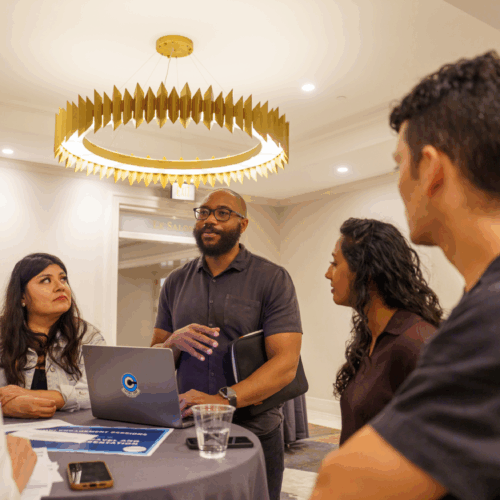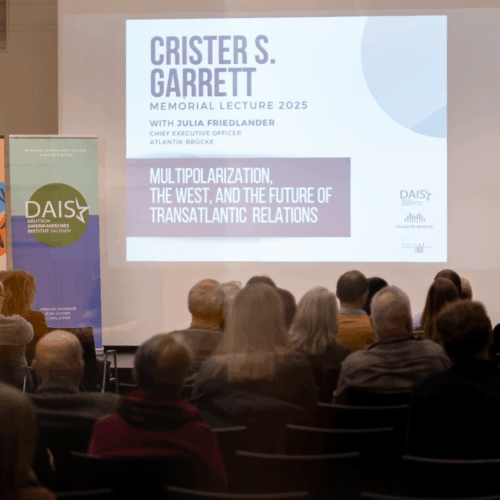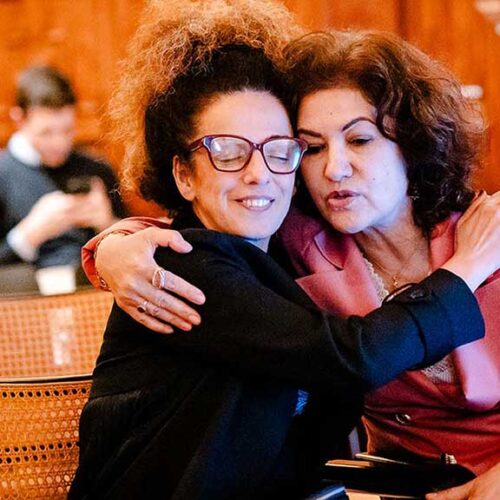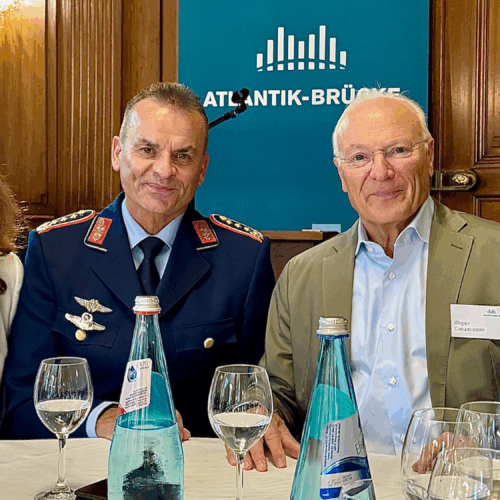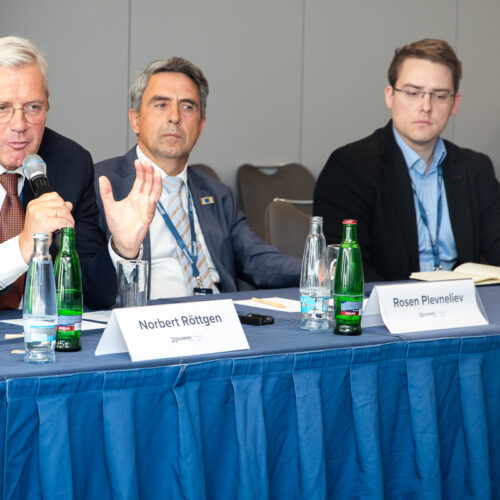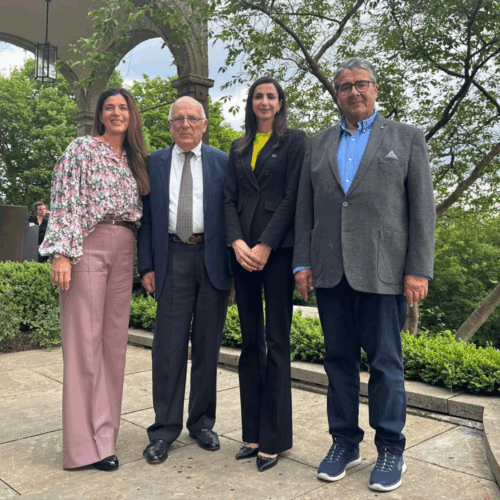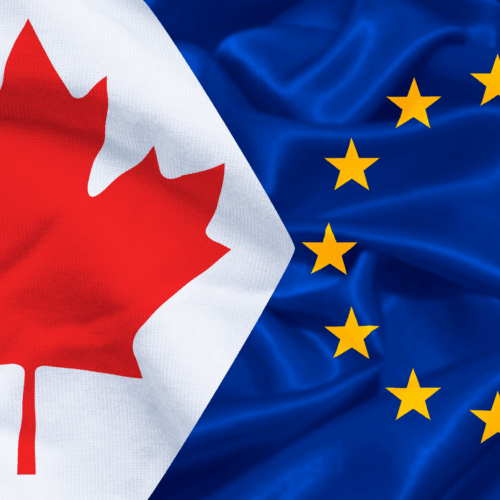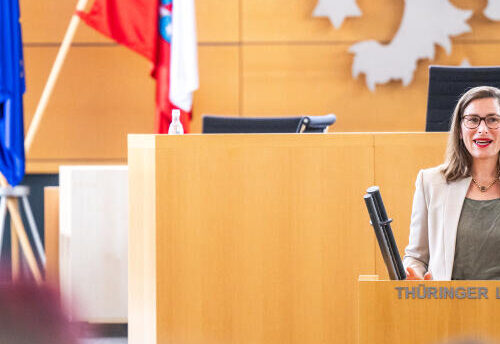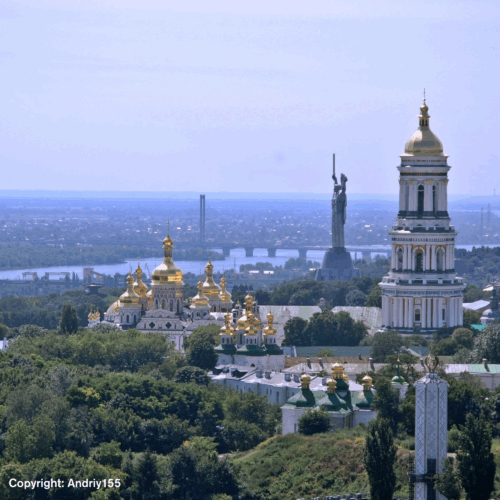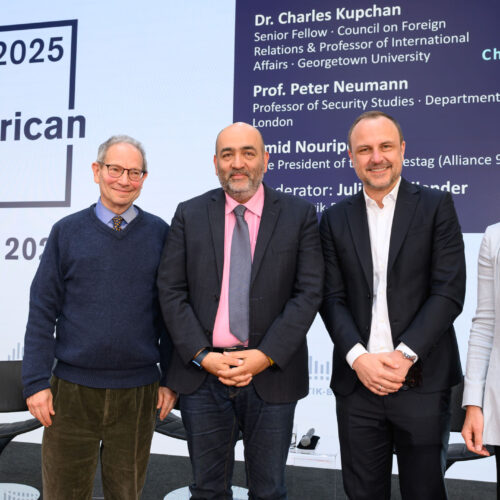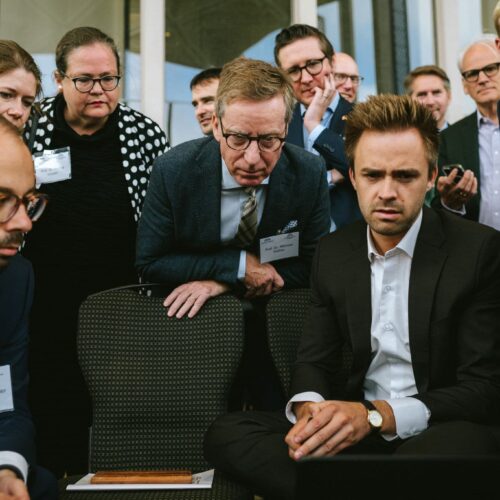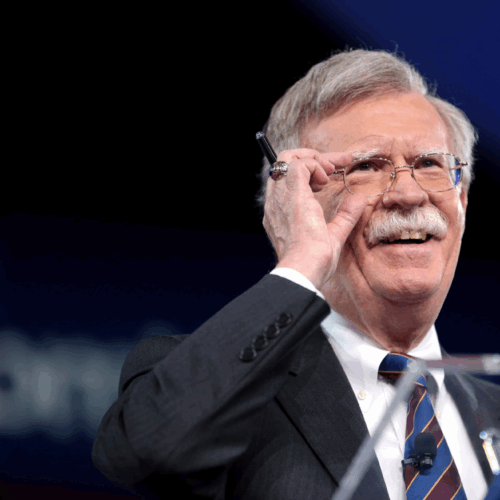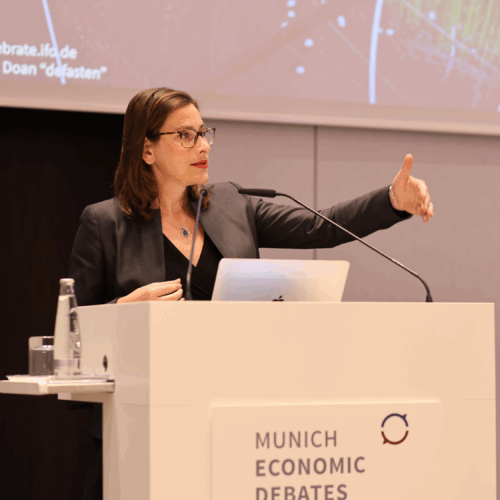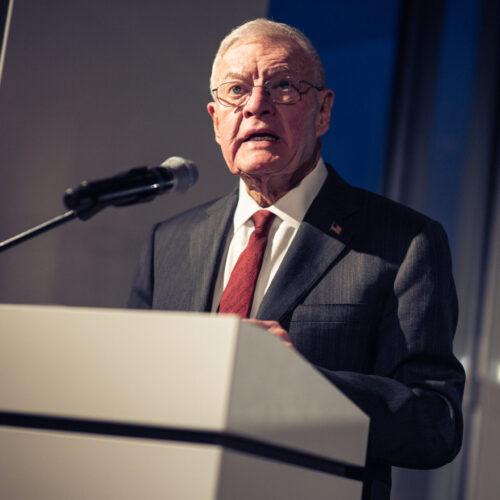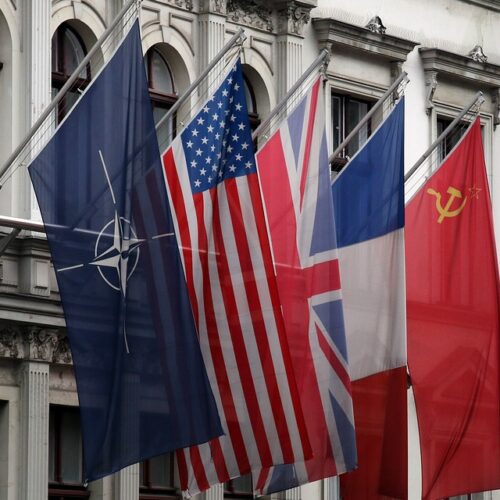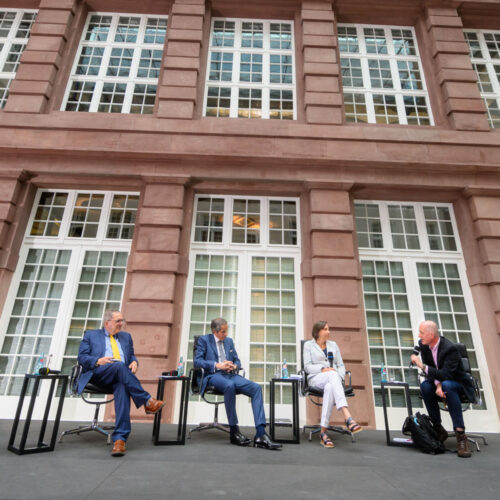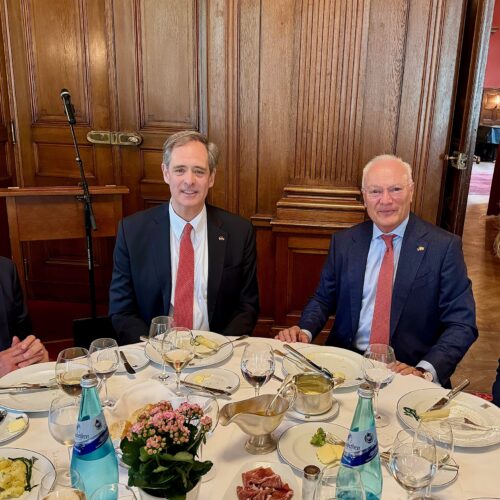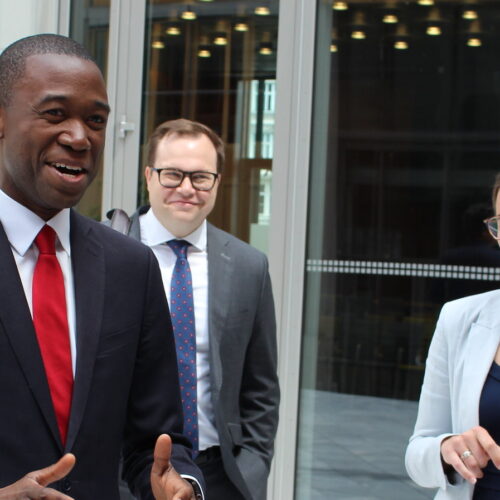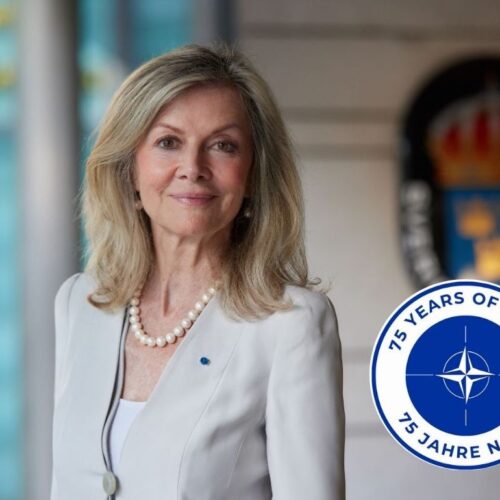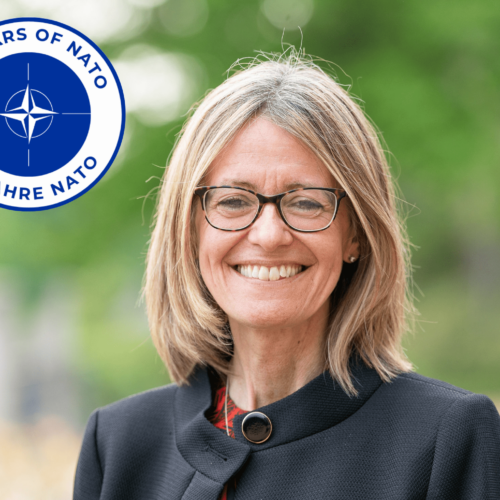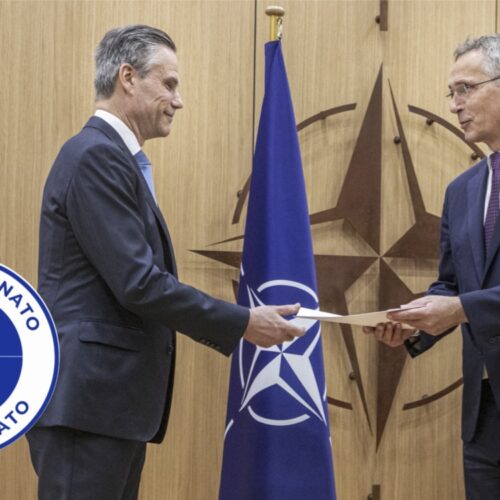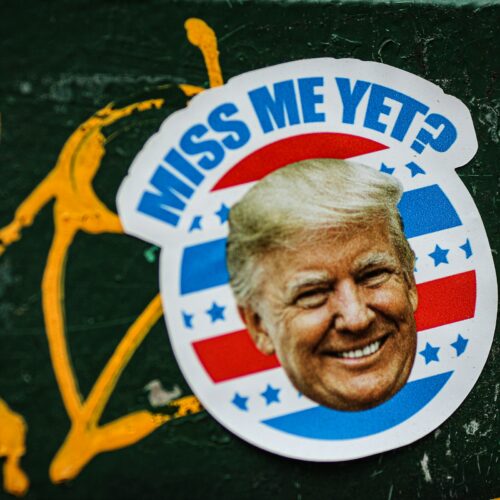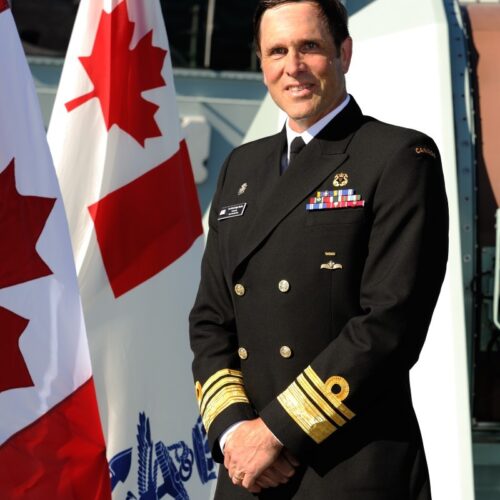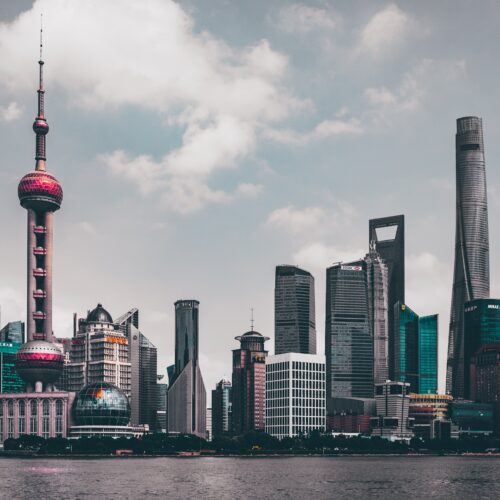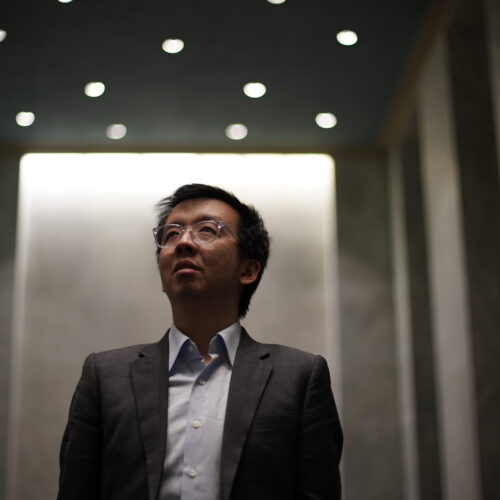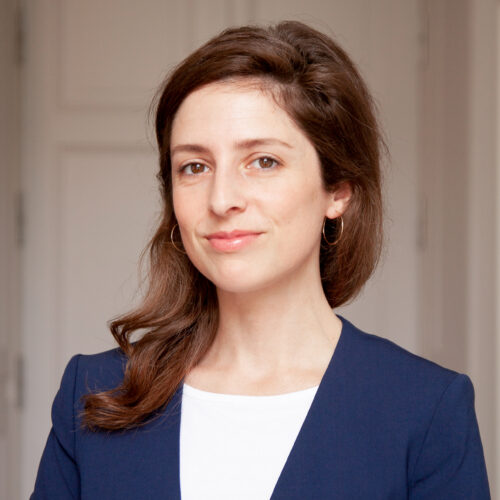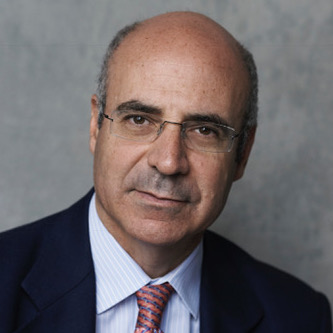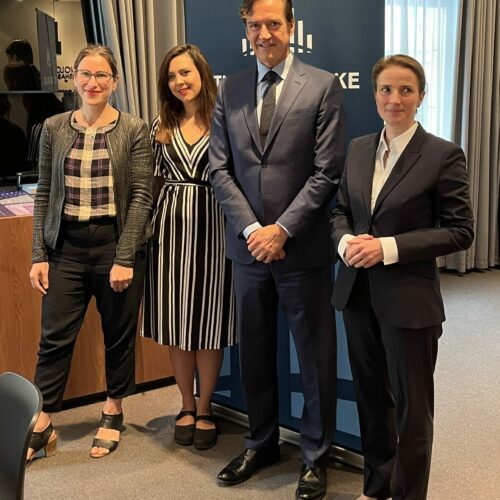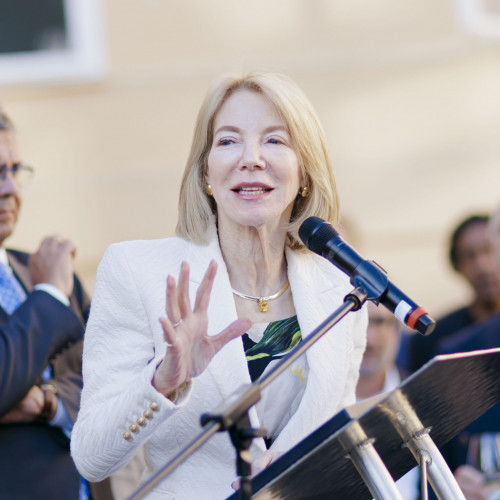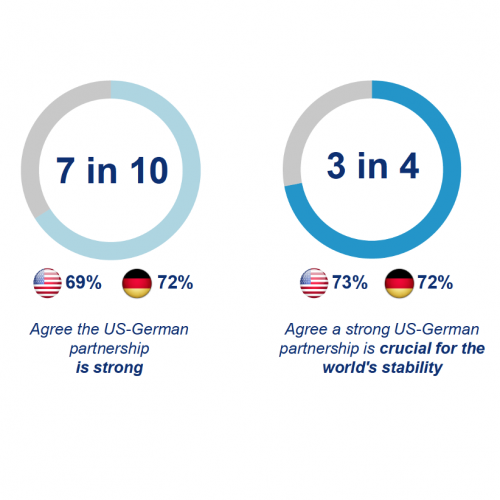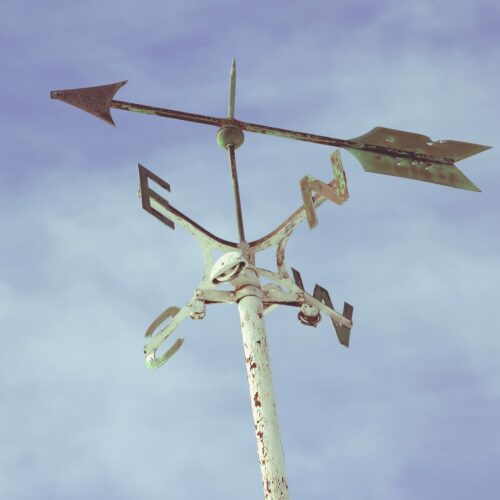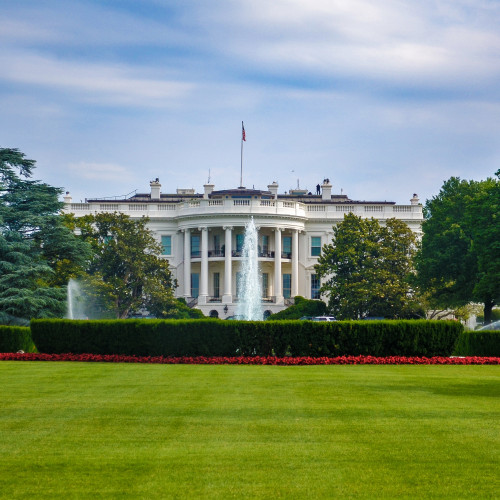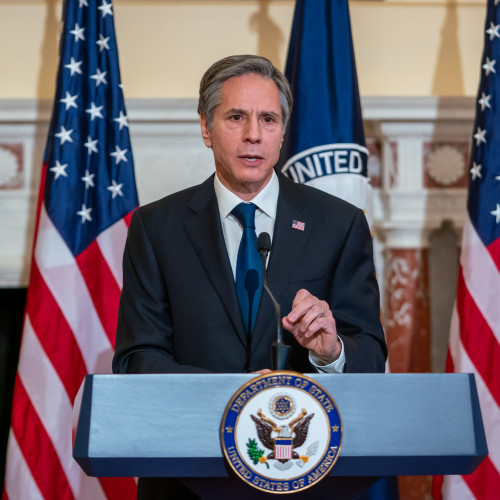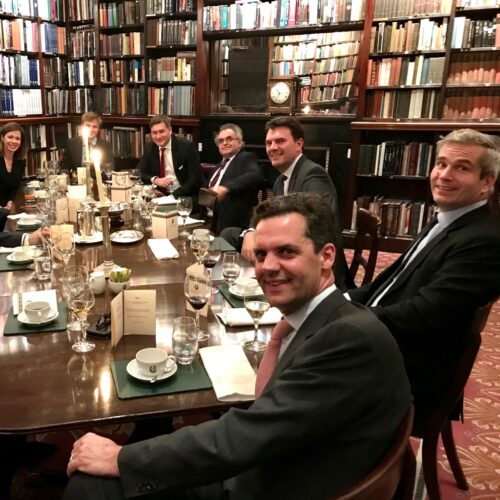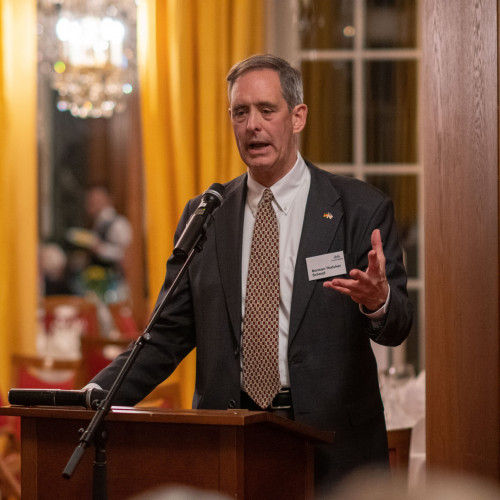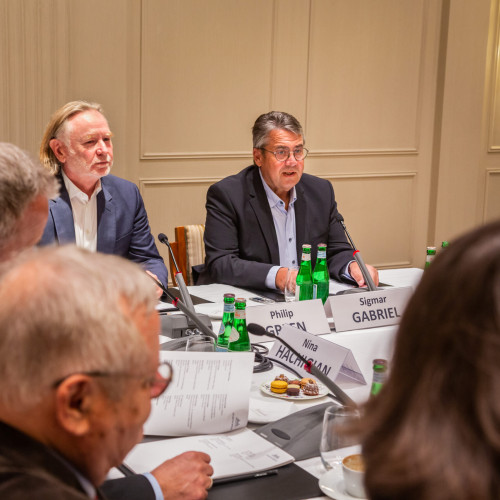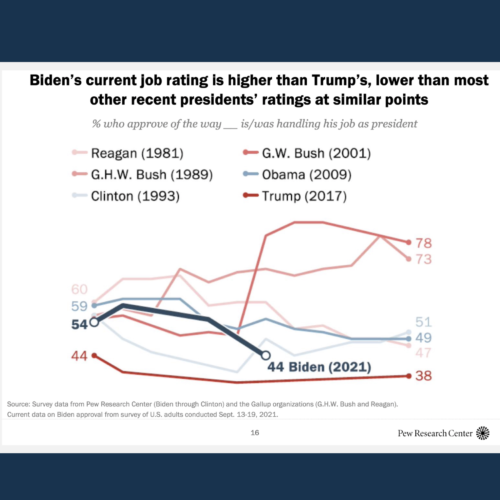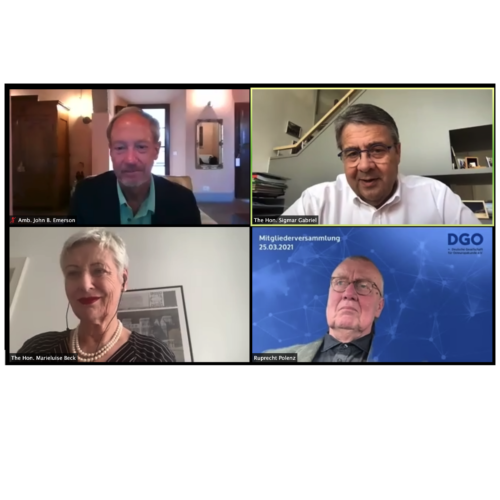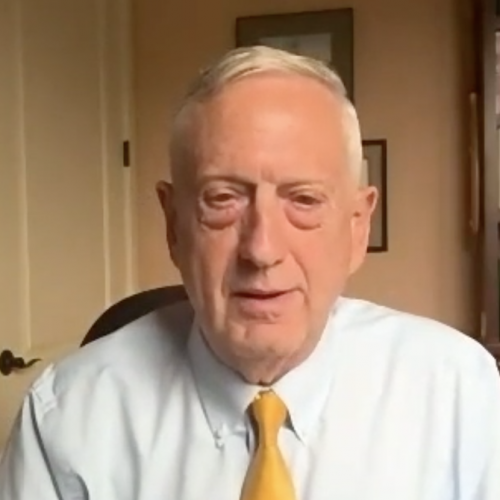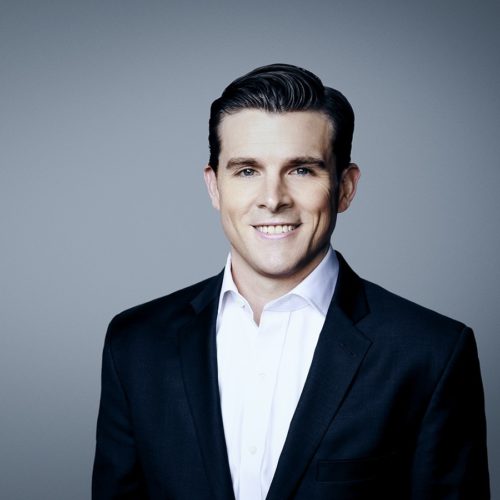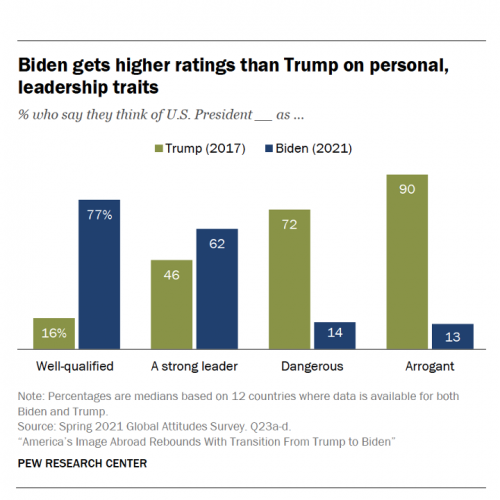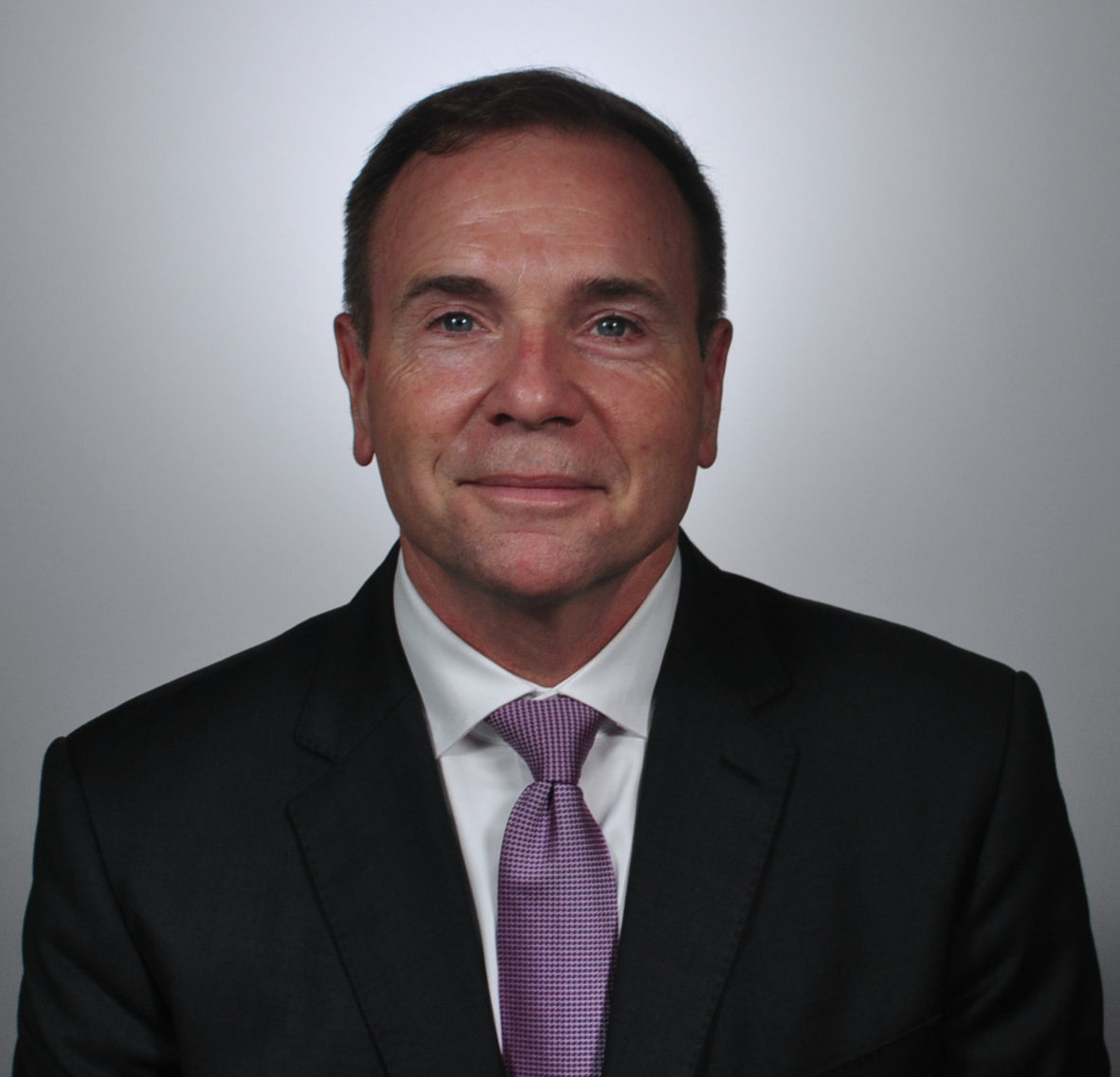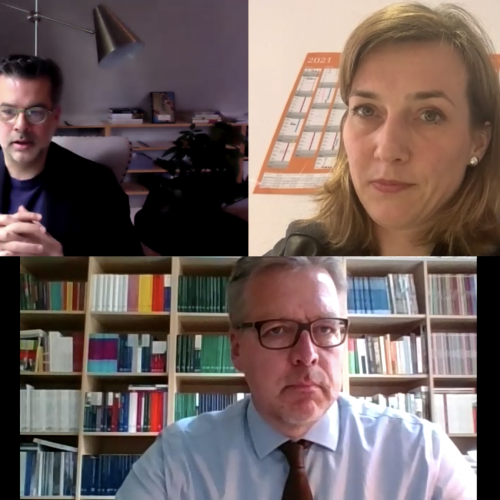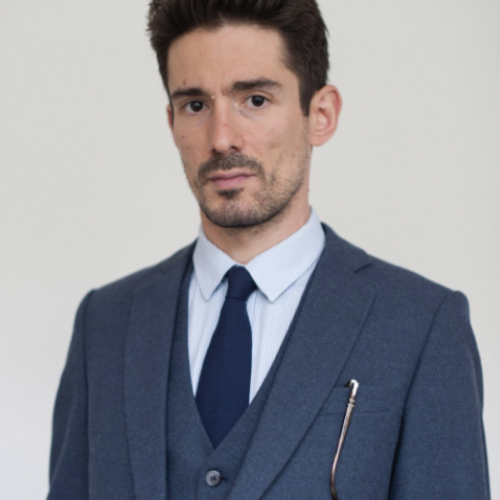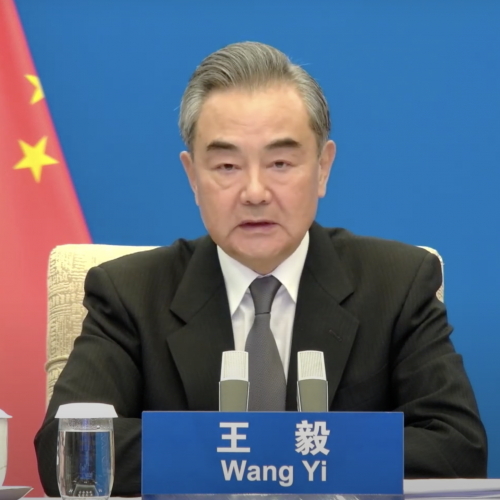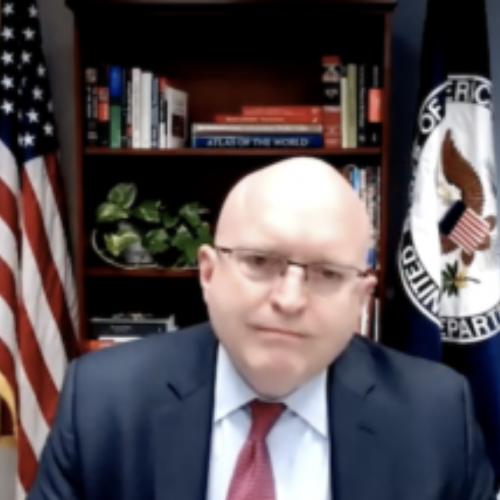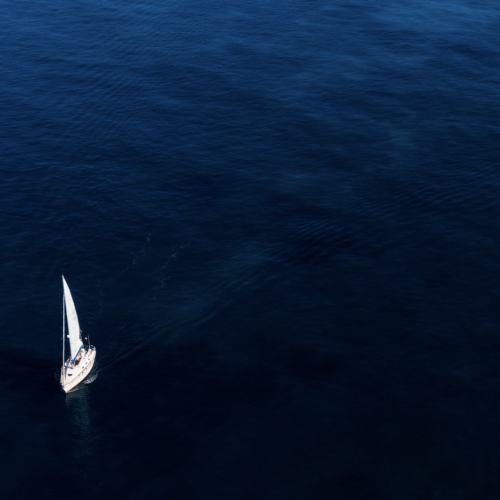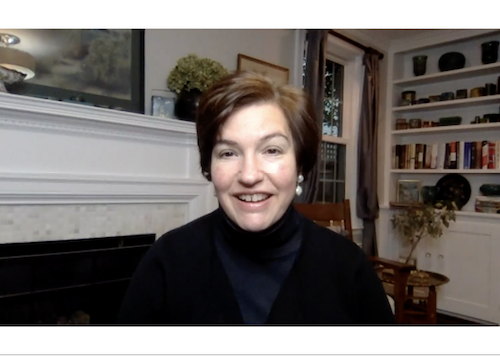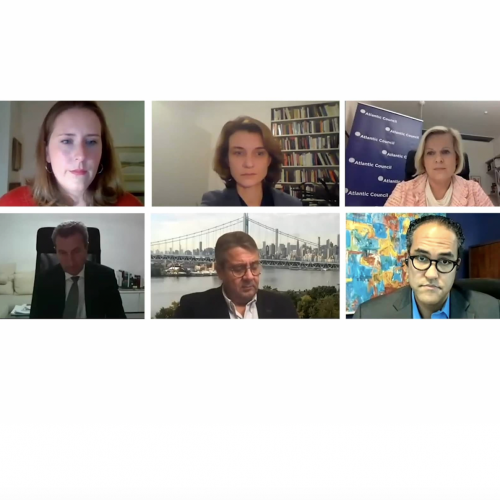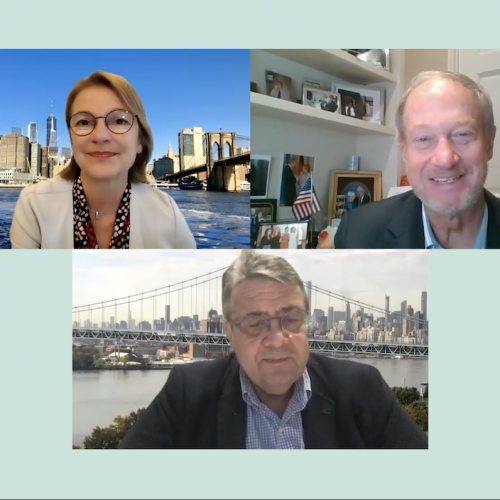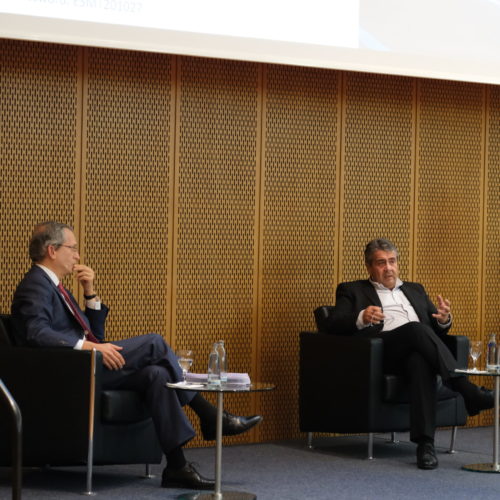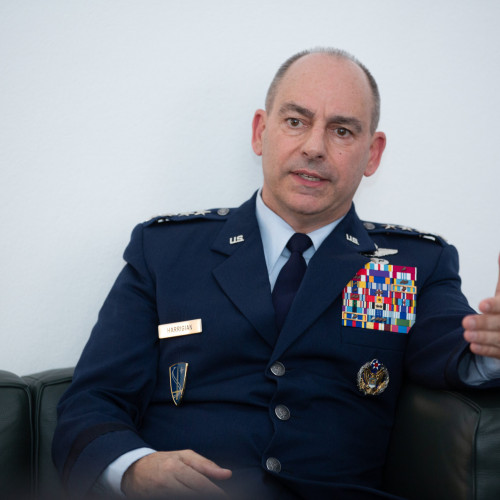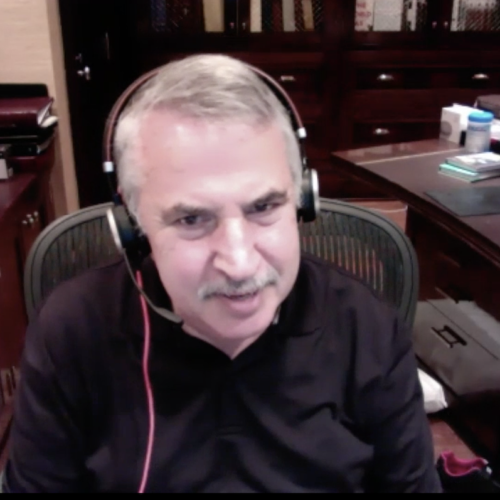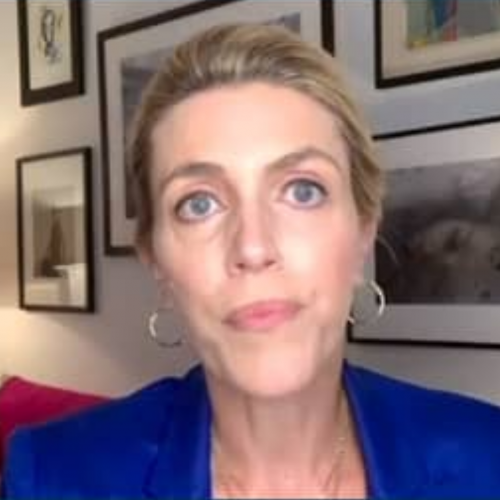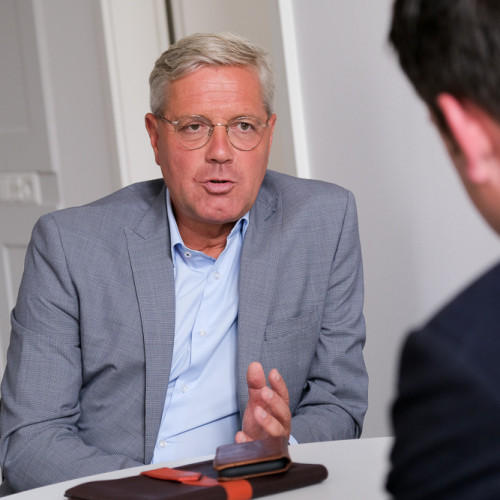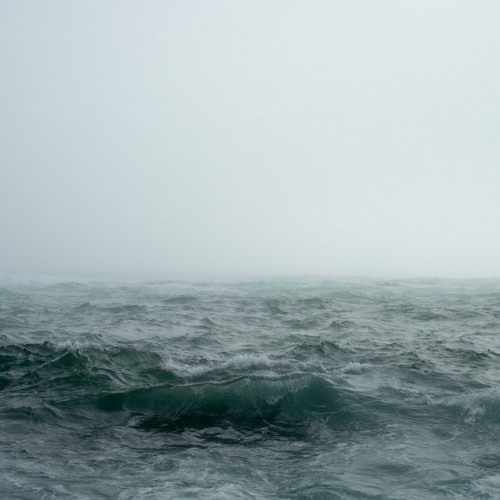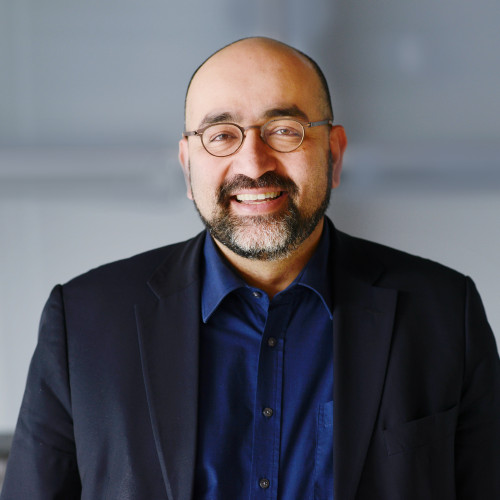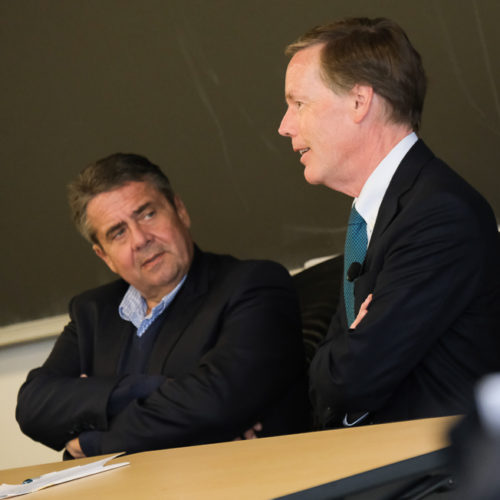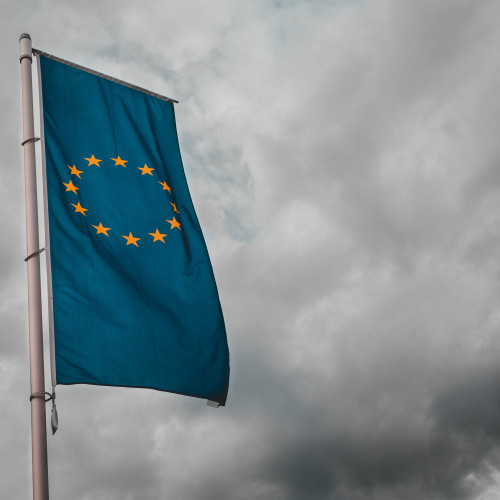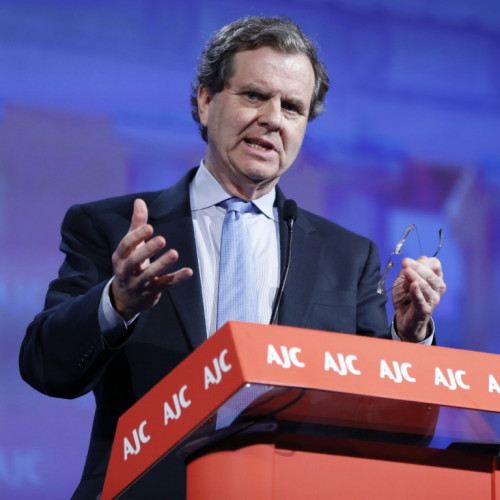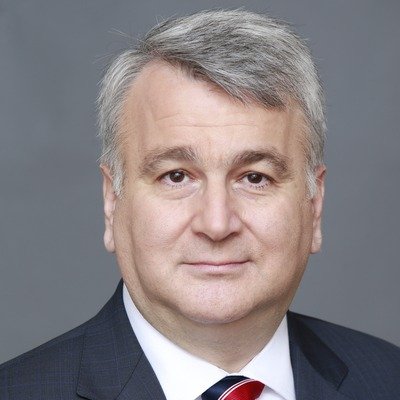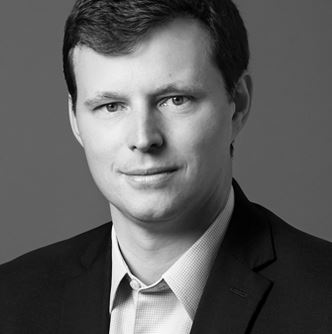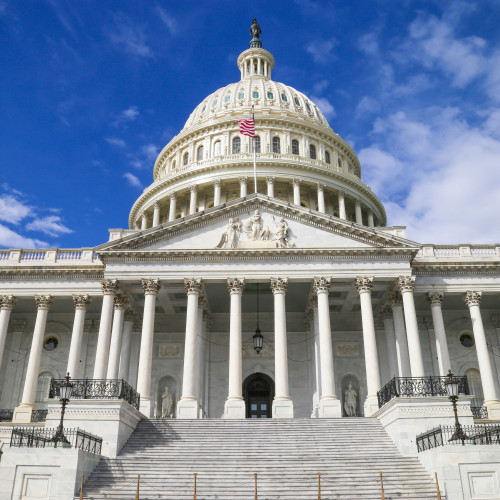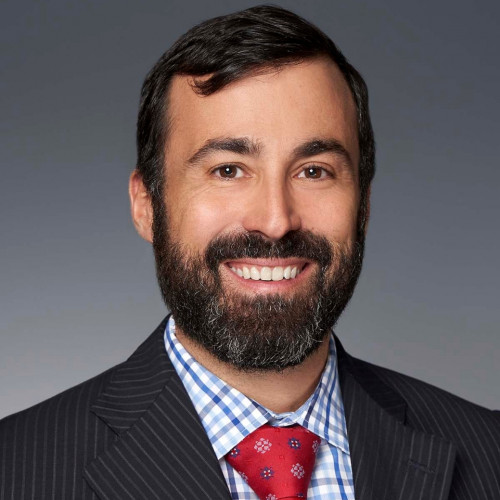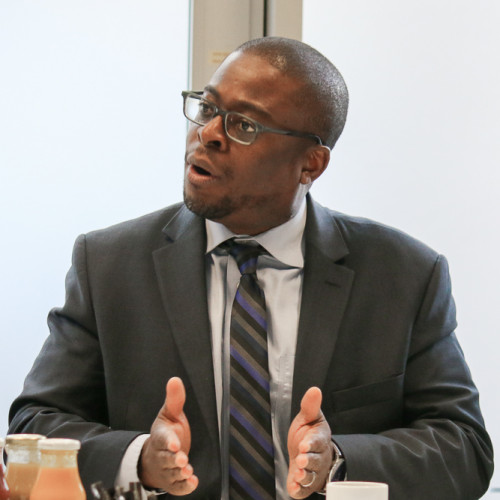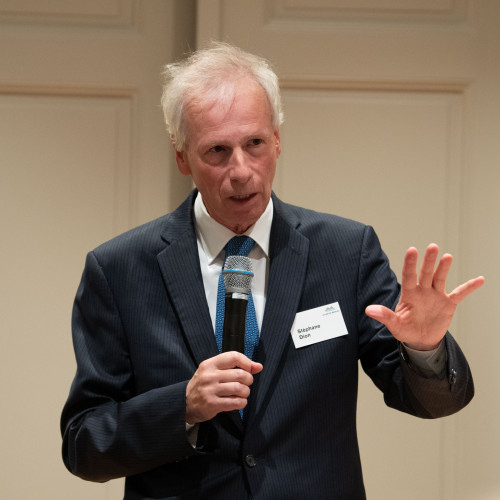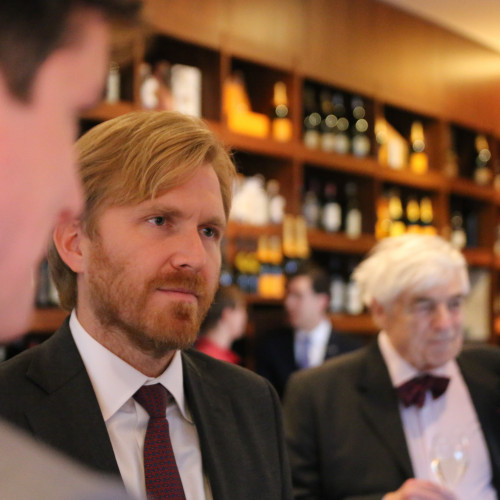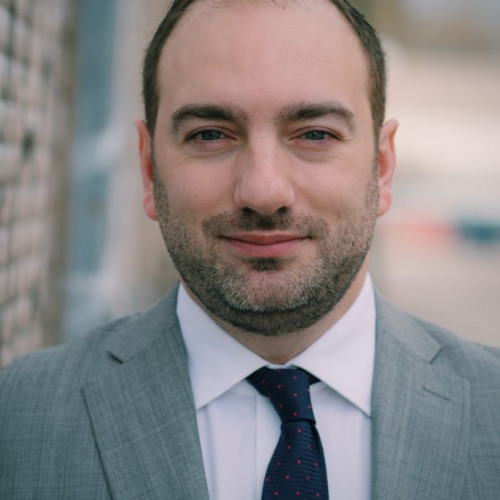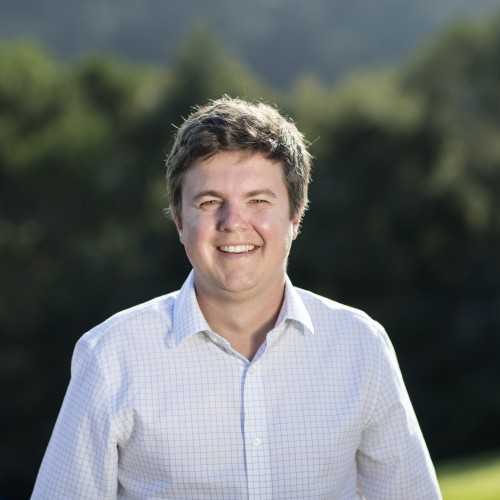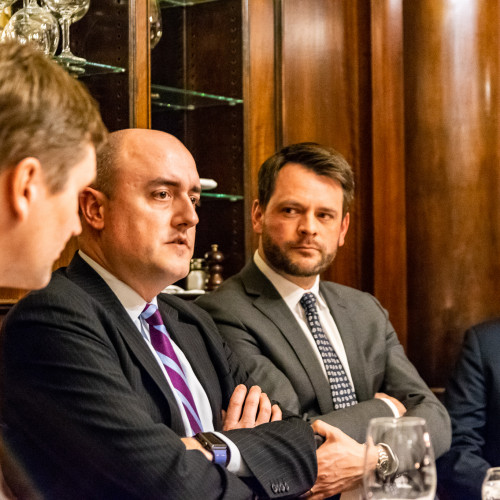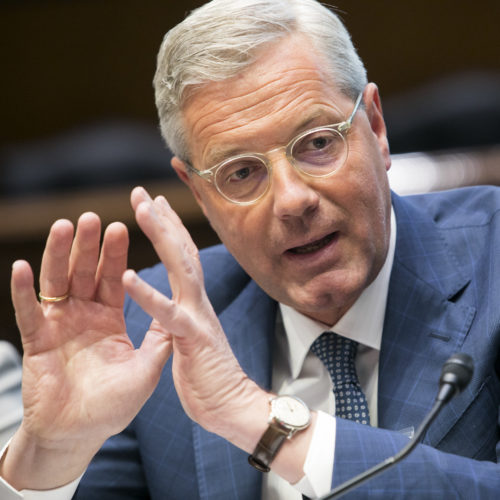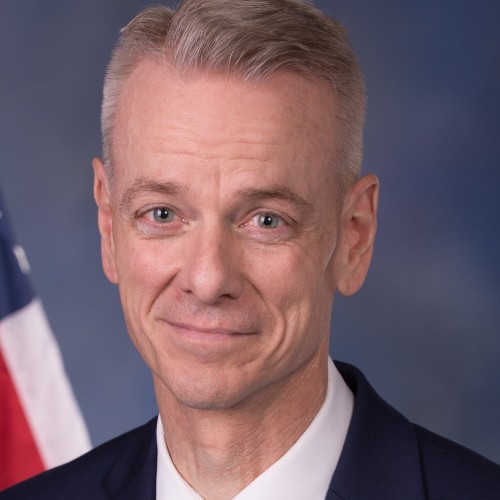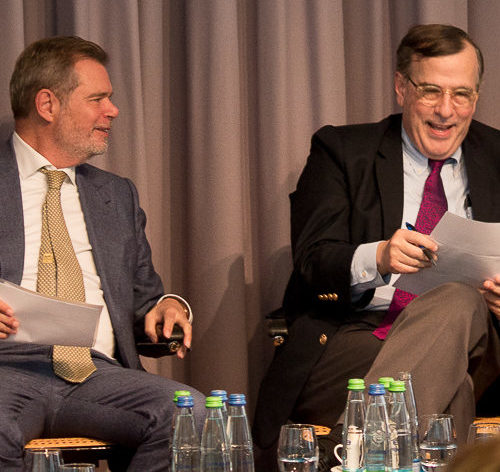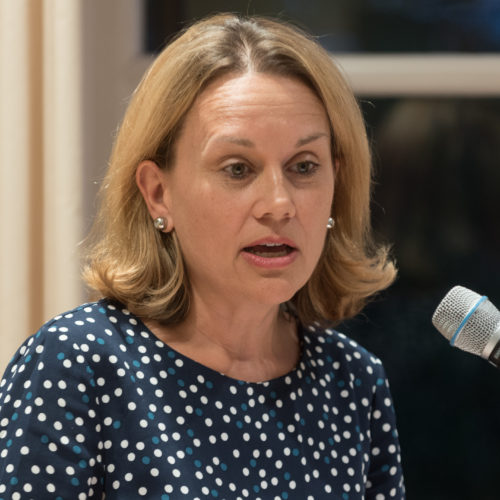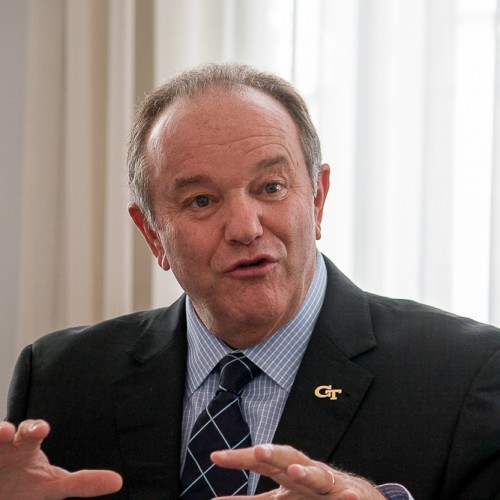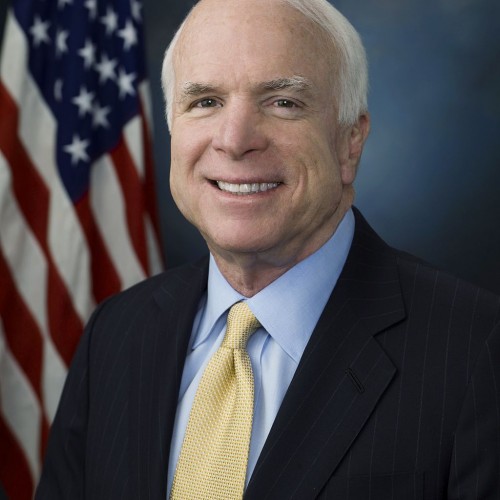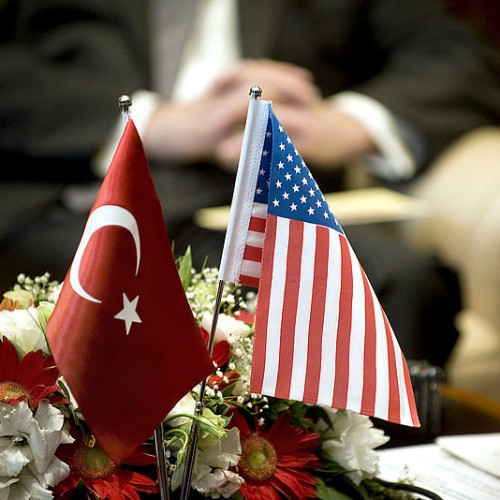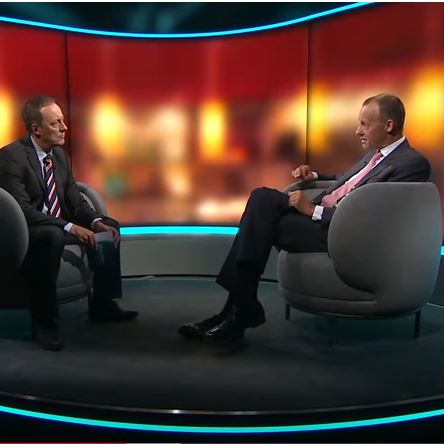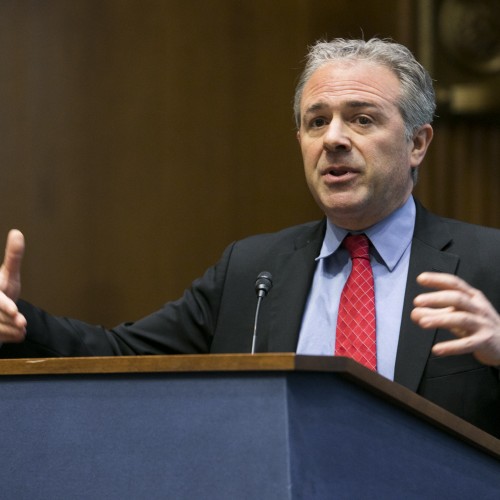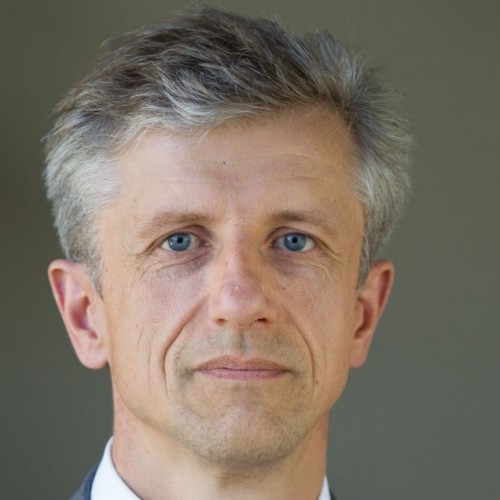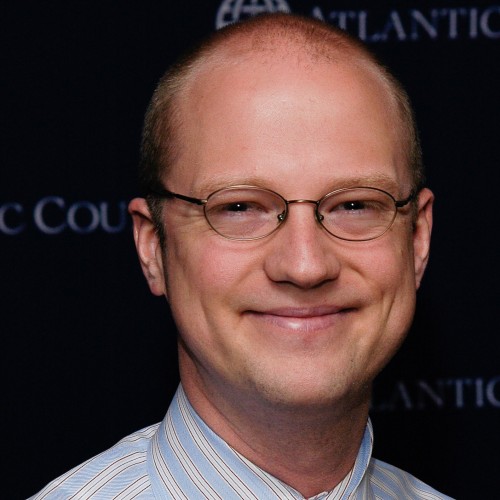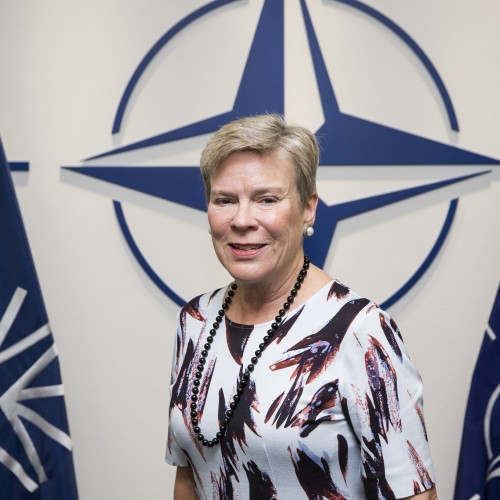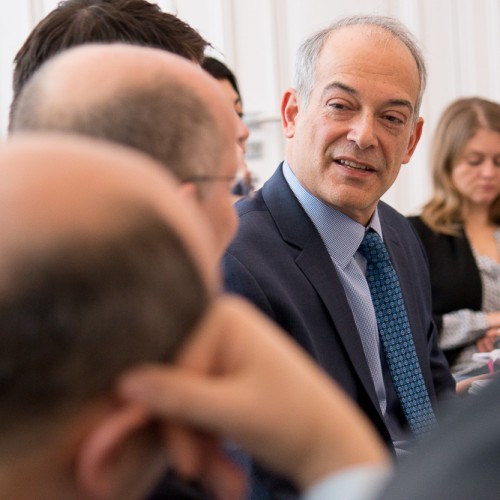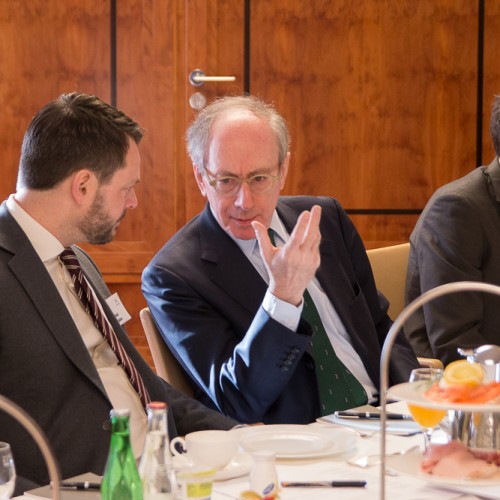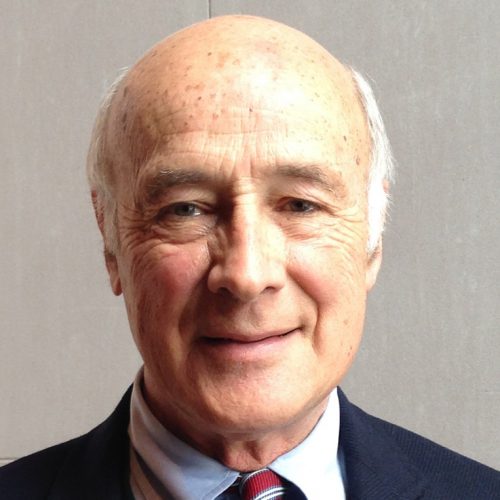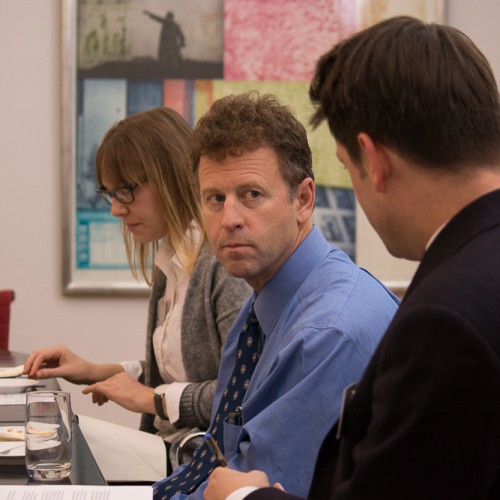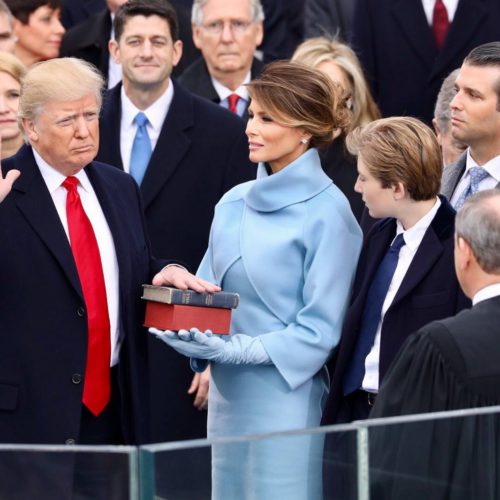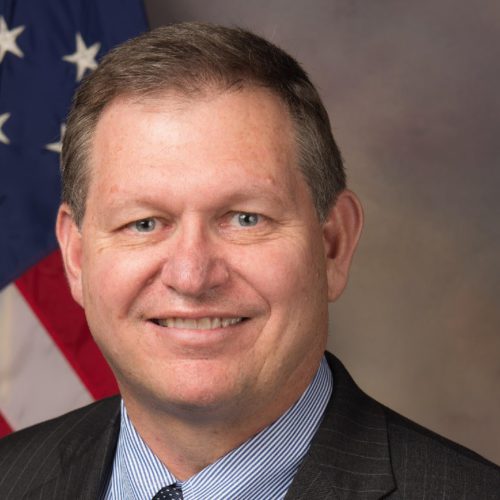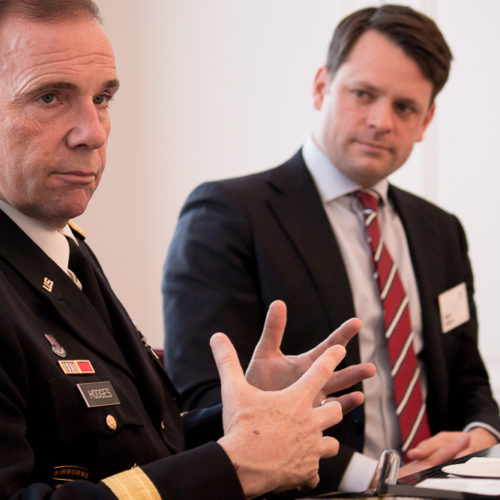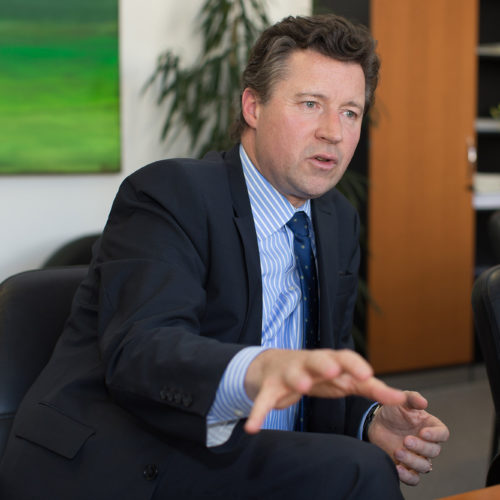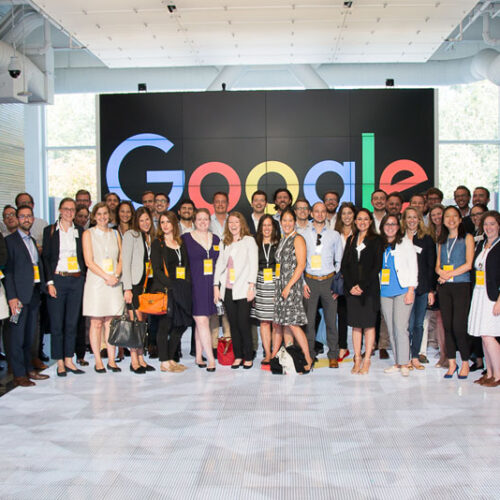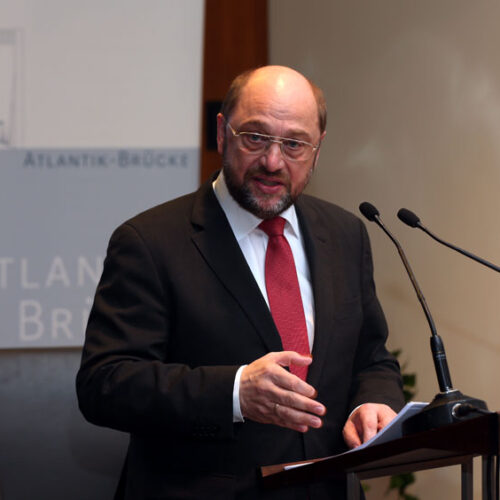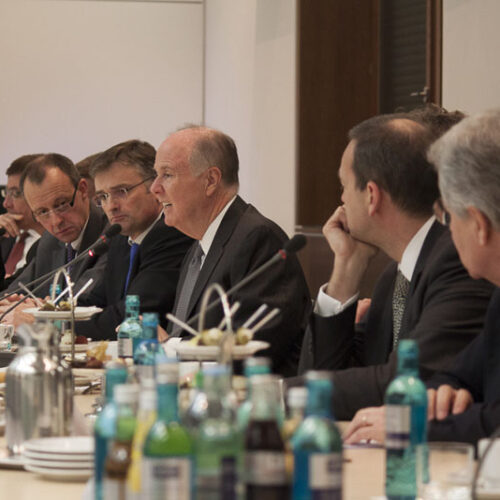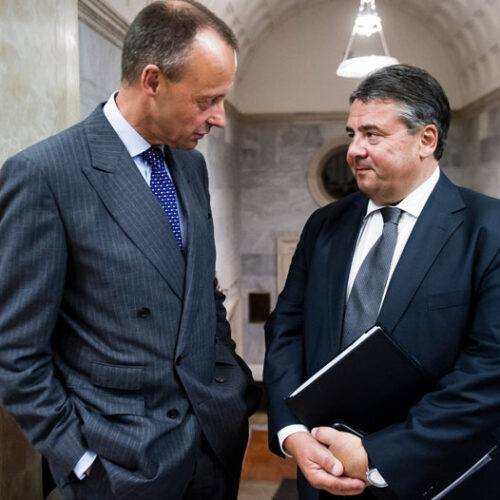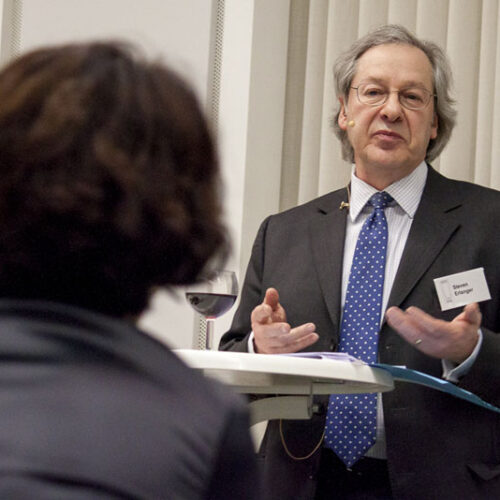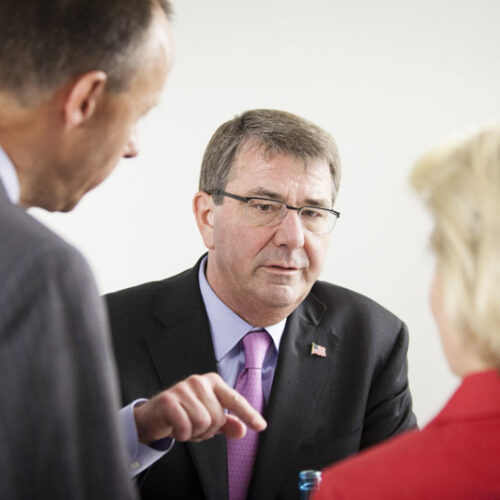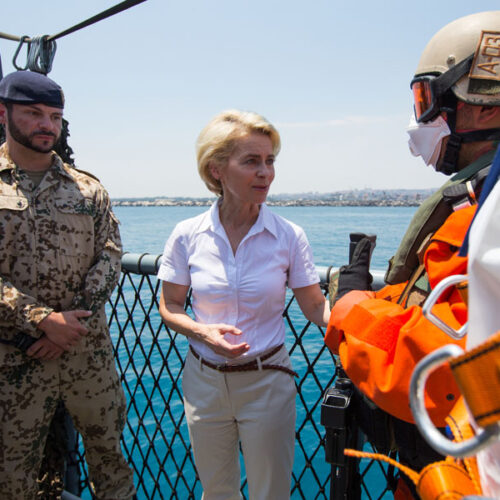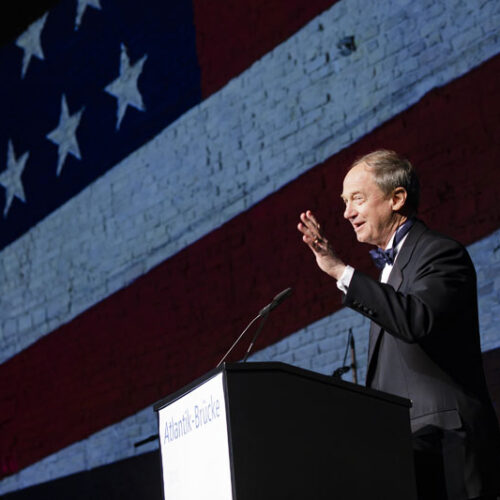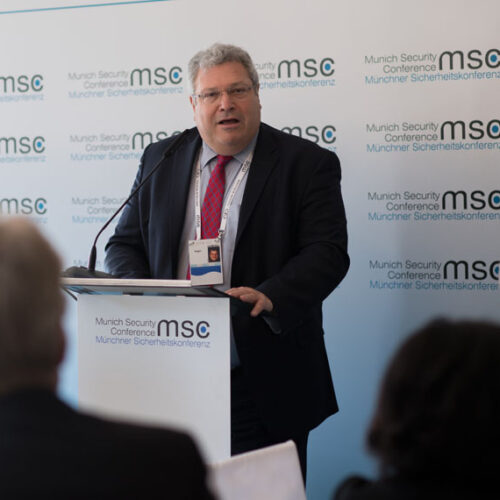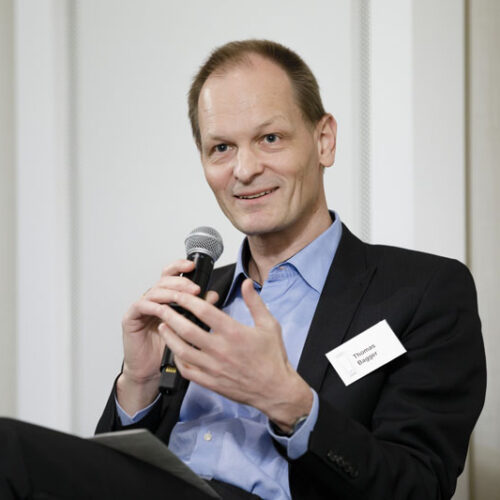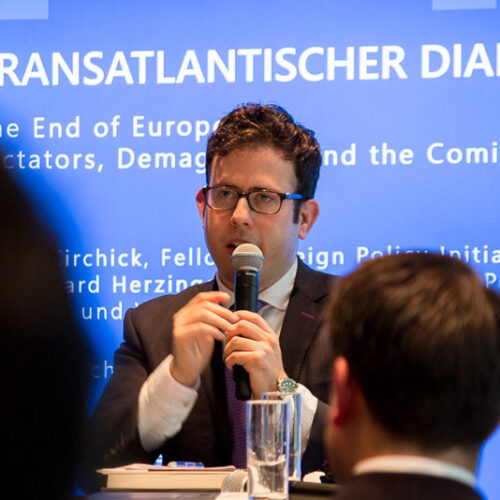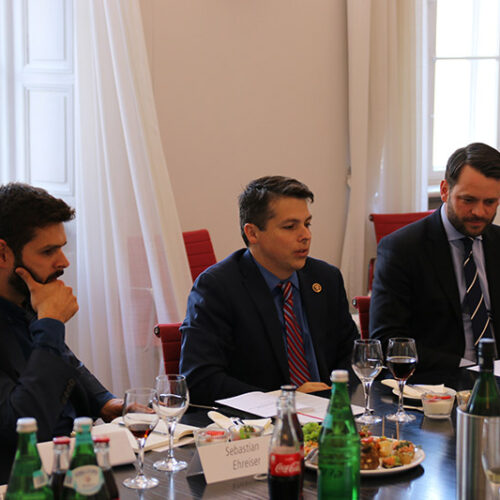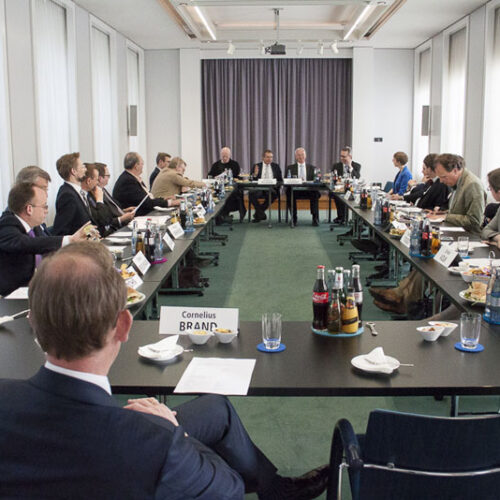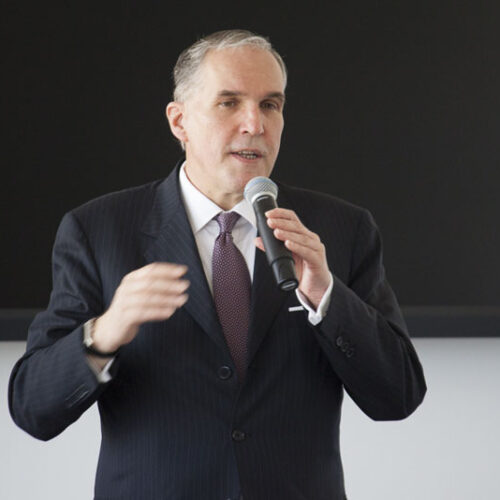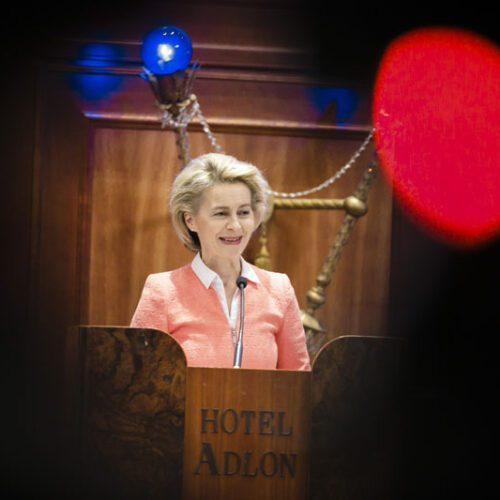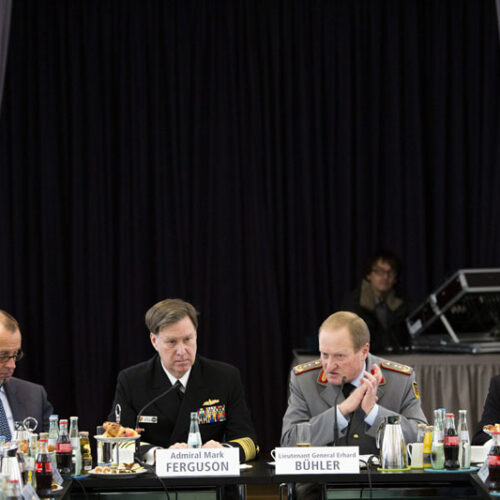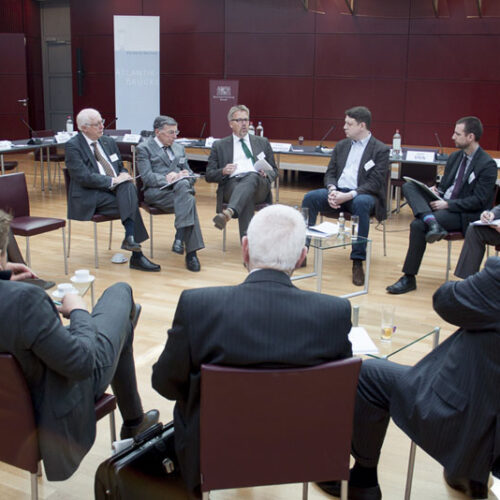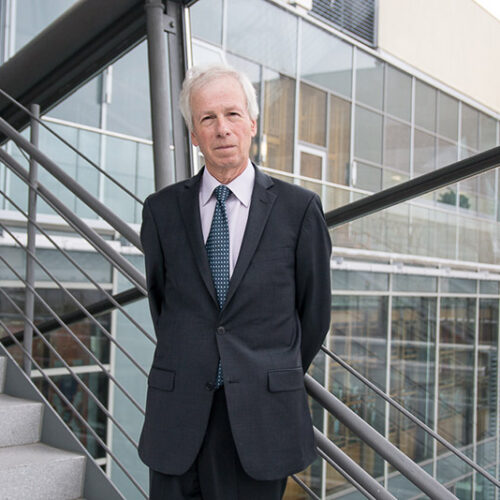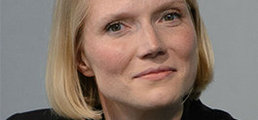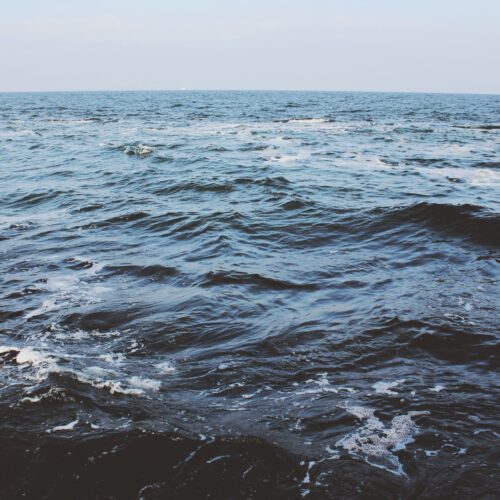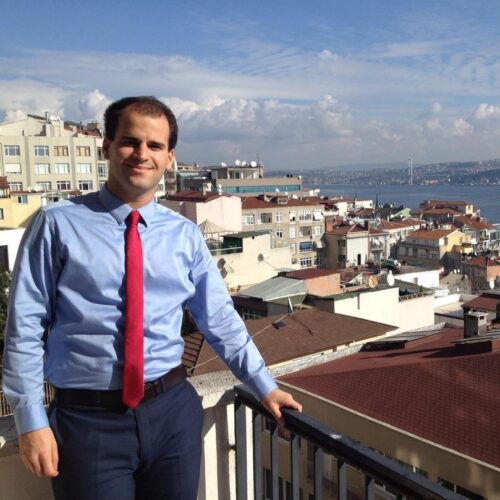An analysis of the US–German relationship through the lens of the New Bridge Alumni conference's learnings.
... more
Workstream Foreign and Security Policy
„Trump may be a charlatan, but the people who voted for him are not.“
At the Crister S. Garret memorial lecture, Julia Friedlander took a look back at the genesis of the Western world order - and shared her thoughts on how to make it future-proof.
... more
Move the world towards freedom
"Call evil by its name, support dissidents, and speak so the imprisoned can hear": Rushan Abbas, Masih Alinejad,
Leopoldo Lopez and Daniel Rothschild spoke at our event "Tear Down This Wall" about freedom.
... more
“Hard power, alone, is never going to be the path to peace”
Europe must redefine its global role, and navigate the limits of American leadership, emphasize Ben Hodges and David Ranan in an interview.
... more
“At least a third of all armed conflicts end without any settlement“
This edition of our web series "Better Be Prepared" took a look back at past conflict settlements.
... more
“You have to concentrate on cyber today”
General Christian Badia emphasizes the need for increased defense spending in order to meet the demands of modern warfare in his video interview.
... more
Europe’s unity is not an end in itself
The GLOBSEC Forum in Prague, themed “Commanding (in) Chaos: Time for Europe to Step Up,” featured Atlantik-Brücke’s first side session on Germany’s role in a capable Europe. Experts from four EU states and the US highlighted three key insights.
... more
“As long as we remain fragmented, we will always rely on Washington”
Following a discussion hosted by our Regional Chapter Hamburg, Sigmar Gabriel gave an interview on the power of intelligence.
... more
Canada and Europe Deepen Defense Ties Amid Rising Global Instability
Kim Lioe provides insights into the growing cooperation between Canada and Europe in the defence sector.
... more
“I refuse to cede my patriotism”
Our CEO Julia Friedlander gave a lecture on the topic of “Renegotiating the World Order” at the Thuringian State Parliament.
... more
“Is the EU still important to Ukraine?”
In our webinar "The Ukraine Negotiations" the speakers tackled pressing questions such as what a peaceful settlement between Russia and Ukraine could look like.
... more
“We can leverage AI to save soldiers’ lives”
Insights from the German-American Conference 2025. Watch our interviews with experts Norbert Röttgen, Fritzi Köhler-Geib and more.
... more
DKK 2025: “Canada and Germany need closer relations”
The German-Canadian Conference in Ottawa on May 5 and 6, 2025 came at just the right time.
... more
„An annexation is highly unlikely“
The last edition of Atlantik-Brücke’s virtual event series “Better Be Prepared” explored the strategic and economic significance of Greenland.
... more
„Putin certainly sees Trump as an easy mark“
In his guest commentary for Atlantik-Brücke, John Bolton, former national security advisor to Donald Trump, talks about Trump's relationship with Putin and urges us not to give up on the transatlantic alliance just yet.
... more
Economics of a Global Market Mudpit
Our CEO Julia Friedlander was a guest at the Munich Economic Debates of the ifo Institute for Economic Research in Munich on March 24th.
... more
“The demolition of Hamas must be the first phase of Gaza’s future“
This edition of our web series "Better Be Prepared" explored the ongoing crisis in the Middle East.
... more
„Wake up Europe and get your act together!“
Insights from our traditional annual reception at Bayerischer Hof on the sidelines of the Munich Security Conference.
... more
Beyond Victims: Women as Architects of Lasting Peace
Atlantik-Brücke’s Female Network convened a high-level discussion on the eve of the Munich Security Conference.
... more
“A successful deterrence of China requires collaboration“
Ben Hodges, Lieutenant General (ret.), U.S. Army, and Senior Advisor at FBH Geostrat Consulting GmbH, shares his insights on how Trump and the new administration might address current geopolitical challenges and their potential impact on the transatlantic relationship.
... more
The challenges of our global security
At this year's Members Meeting's panel discussion "China, Russia, the Tech Race, and Western Resilience," several experts shared their insights on the critical geopolitical landscape and its impact on global security. The panel included David Sanger, Rafael Mariano Grossi and Beth Sanner. It was moderated by Christian Mölling.
... more
“Democracy comes with responsibilities”
Outgoing Consul General Norman Thatcher Scharpf talks about the development of transatlantic relations.
... more
The US and Europe have to further increase pressure on Russia – and China
Russia's war of aggression against Ukraine would not be possible without China's supply of dual-use goods, said US Deputy Treasury Secretary Wally Adeyemo in a speech at Atlantik-Brücke. His entire speech is documented below.
... more
Sweden has finally come home
Sweden's ambassador to Germany, Veronika Wand-Danielsson, sees her country's accession to NATO as a Swedish "Zeitenwende".
... more
The bedrock of European security has British DNA
Jill Gallard, Ambassador of the United Kingdom to Germany, pays tribute to the special British contribution to NATO.
... more
Finland in NATO is a Security Provider
In this guest article, the former Finnish Ambassador to NATO writes about Finland's accession to the Transatlantic Alliance
... more
How to Trump-proof Europe
If the former US President gets elected one more time, the European Union needs to be prepared in several key policy fields to sustain the transatlantic partnership, writes the author Steven Hill in his analysis.
... more
Statement by the Board of Directors on the attack on Israel
Statement by the Board of Directors of Atlantik-Brücke on the Attack of the Terrorist Group Hamas on the State of Israel.
... more
“Canada’s commitment to the Indo-Pacific is year-round”
Angus Topshee, Commander of the Royal Canadian Navy, explains Canada's Indo-Pacific Strategy.
... more
Russian Propaganda in the Southern Hemisphere: A Simplistic Scapegoat
Gavin Wilde, Senior Fellow at the Carnegie Endowment for International Peace, analyzes the effects of Russian disinformation campaigns in the global south.
... more
De-risking as an economic strategy
Ursula von der Leyen, President of the EU Commission, has proposed a "De-risking" strategy for Europe vis-à-vis China in contrast to a "De-coupling" approach. Bruegel's Senior Fellow Maria Demertzis analyzes the prospects of success.
... more
“No one is safe from repression by the Chinese Communist Party”
Hong Kong is a symbol of how autocratic regimes can stifle freedom and democracy. In this interview, activist and organizer Samuel Chu speaks about why this concerns the transatlantic partners, too.
... more
A vicious politicization of everything
In her column, Elisabeth Zerofsky writes about the political polarization in the US, which also affects foreign policy issues - not least in the case of the Ukraine war.
... more
“China should be afraid of us”
In this Atlantik-Bruecke-Interview, Bill Browder, CEO of Hermitage Capital LLP and Putin's former "enemy No. 1," explains his assessments of the Russian president and options for further sanctions against Russia.
... more
A Taiwan Crisis Looms on the Transatlantic Horizon
The status of Taiwan is increasingly preoccupying the states of the democratic West. What are the current risks of escalation by China? And what could possible sanctions look like in response?
... more
On Board! Finland and the New NATO
Ambassador Kai Sauer, Under-Secretary of State for Foreign and Security Policy, Ministry for Foreign Affairs of Finland, gives insight into Finland's perspective on Russia's war against Ukraine and Finland's application to join NATO.
... more
„The defense of democracy is the defining challenge of our time.“
U.S. Ambassador Gutmann, in a moving speech against the backdrop of the Ukraine war, stressed the need to protect democracy against attacks by its enemies.
... more
“The State of Trust and the US-German Partnership: A Transatlantic Survey”
A new study conducted on occasion of the German-American Conference shows that the majority of Germans and Americans see the transatlantic partnership as crucial for global stability.
... more
In Search of a New World Order
Russia's war against Ukraine dramatically demonstrates that the world is fundamentally changing, write Sigmar Gabriel and Michael Hüther. How can Europe help shape this change?
... more
Germany needs to protect Europe
As the most prosperous and powerful country in Europe, Germany needs to relieve the United States by defending Europe against Russian aggression, writes Peter Rough of the Hudson Institute.
... more
Rebuilding Trust: How Germany Can be a Reliable Partner
His meeting with President Biden presents a chance for Chancellor Scholz to underline Germany's reliability and leadership, write Sigmar Gabriel and John B. Emerson.
... more
The priorities of Germany’s new government
John B. Emerson and Sigmar Gabriel analyze the domestic and foreign policy priorities of Germany's new federal government, the so-called traffic light coalition.
... more
Keynote by U.S. Secretary of State Anthony J. Blinken
Atlantik-Brücke, the American Council on Germany, Aspen Institute Germany and the German Marshall Fund of the United States were honored to host the U.S. Secretary of State Antony J. Blinken for a keynote on the transatlantic partnership.
... more
“Britain has to be careful not to be sidelined by the US on the world stage”
Columnist Philip Collins and UK Correspondent Ulrich Oppold on the transatlantic relationship and Britain's role.
... more
“We need alliances – now even more than ever”
Atlantik-Brücke was honored to welcome U.S. Consul General Thatcher Scharpf to Frankfurt. The Consul General shared a positive outlook on transatlantic relations.
... more
AUKUS – an Australian Perspective
Australia's Ambassador in Germany, H.E. Philip Green, gives insight into Australia's perspective on the Indo-Pacific.
... more
Changing Views of and in the United States
Jacob Poushter, Pew Research Center, explains the latest polling data on the U.S. image abroad, troop withdrawal in Afghanistan, and President Biden's approval ratings at home.
... more
Election Readout 2021
Journalists, Scholars and Politicians comment on the implications of the outcome of the German elections.
... more
“The more stable our democracies are, the less terrorists can harm us”
In an interview, Sigmar Gabriel talks about 9/11 and its consequences.
... more
“Allies, allies, allies”
General James Mattis, United States Marine Corps (Ret); 26th U.S. Secretary of Defense, spoke at Atlantik-Brücke’s Young Leaders Conference 2021 about what matters most in foreign policy.
... more
“A 1949 Moment”
Ambassador Victoria Nuland, Under Secretary for Political Affairs at the U.S. Department of State, spoke with John B. Emerson, Chairman of the ACG, and Sigmar Gabriel, Chairman of Atlantik-Brücke, about President Biden's recent trip to Europe, the common challenges ahead and the priorities for U.S. foreign policy.
... more
“A good starting point”
In an interview, Phil Mattingly, CNN, speaks about the outcome of President Biden's first trip to Europe in June 2021.
... more
America’s Image Abroad
For the release of Pew Research's new survey on America's image abroad, we spoke to Richard Wike, Director of Global Attitudes Research.
... more
The Challenges of Future War
Lieutenant General (ret.) Ben Hodges talks about the character - both technological and geopolitical - of future war, as outlined in his latest book.
... more
The Transatlantic Alliance after Afghanistan
Bruce Jones, Brookings Institution, and Markus Kaim, SWP, discuss NATO's withdrawal from Afghanistan with Siemtje Möller, MdB (SPD).
... more
“Little Time for Major Foreign Policy Projects”
Bojan Pancevski, the WSJ's Germany correspondent, on the new U.S. administration and transatlantic relations.
... more
A Conversation on Relations between China and the West: A Perspective from Beijing
Wang Yi, Sigmar Gabriel, Federica Mogherini, and Wolfgang Ischinger discuss the future of the EU's and the West's relationship with China.
... more
Reaffirming and Reimagining the Transatlantic Alliance: Facing Shared Challenges Together
Philip T. Reeker, Acting Assistant Secretary of State for European and Eurasian Affairs, on the challenges for the transatlantic partnership.
... more
More Ambition, Please!
With President Biden, there is an opportunity to overcome the crisis in transatlantic relations. To this end, Germany should reach a New Agreement with the U.S. government, writes a group of transatlantic experts intheir appeal.
... more
Transition: Review & Outlook on 2021
Susan Glasser, Elmar Theveßen, and Sigmar Gabriel review 2020 and give an outlook on foreign relations in 2021.
... more
After the U.S. Election – What to Expect from the New Presidency?
Discussion between Will Hurd, Sigmar Gabriel, Günther Oettinger, Daniela Schwarzer, and Anna Wieslander on the Future of the European-American Partnership.
... more
After Trump: Rebuilding Anglo-European Relations in Challenging Times
Josh Glancy, The Sunday Times, and Rachel Rizzo, Center for a New American Security, on the future of Anglo-European and transatlantic relations after Trump.
... more
Reinventing the German-American Agenda in 2021
Sigmar Gabriel and John Emerson discuss the future of German-American relations.
... more
What Can We Expect from a Biden Administration?
Charles Kupchan, former national security advisor for the Obama Administration, talks about the impacts of Joe Biden's election on domestic and foreign policy with Michael Werz.
... more
Will transatlantic relations improve after the US election?
Former US-Ambassador to the EU, Anthony Luzzato Gardner, discussed transatlantic relations with Atlantik-Bruecke-Chairman Sigmar Gabriel.
... more
“As a leader, you have to take the time to make a personal connection”
General Jeffrey Harrigian, Commander of the United States Air Forces in Europe and Air Forces Africa, speaks about the crucial aspects of "connected leadership" within foreign and security policy.
... more
The Need for a Transatlantic China Strategy
A 4-minute-assessment by New York Times Op-Ed Columnist and Pulitzer Prize winner Thomas L. Friedman on the US’s and Europe's relationship with China, Trump's unilateral approach and the need for multilateral cohesion.
... more
Foreign Interference in the Upcoming U.S. Election?
Award-winning journalist Clarissa Ward speaks about the possibilty of renewed Russian interference in the US elections.
... more
Röttgen: “Sanctions must never be used against partners”
Norbert Röttgen, Chairman of the Foreign Affairs Committee of the German Bundestag, criticizes the recent escalation of the U.S. Senate against Nord Stream 2.
... more
The ball is in Europe’s court
President Trump's announcement to withdraw 9,500 US soldiers from Germany marks a historic low in relations with America. Atlantik-Brücke's Managing Board calls for measures to overcome the crisis. Europe has to start playing a more active role in transatlantic relations, having sailed in the USA's wake for too long.
... more
Beyond Location: Germany’s Debate on NATO’s Nuclear Sharing Agreement
Ben Hodges and Götz Neuneck discuss Germany's role in NATO's nuclear sharing.
... more
COVID-19 in Russia and Belarus
The pandemic makes the leaderships in Moscow and Minsk nervous, observes Omid Nouripour. Will it unleash forces that they cannot control?
... more
Covid-19 and its implications for transatlantic relations
Ambassador Nicholas Burns and Atlantik-Brücke-Chairman Sigmar Gabriel discuss how the pandemic is and should be addressed by the transatlantic partners. While they agree it is natural for governments to prioritise caring for their own citizens, they underline that the global health crisis, which will be followed by a global economic crisis, needs to be addressed in a cooperative effort.
... more
Finding Europe’s Way in the World
Sigmar Gabriel and Michael Hüther argue that the global balance of power is shifting rapidly. Europe must now find its own way to promote cooperation among Western partners.
... more
“To this day, many of us still wrestle with excruciating pain“
David Harris, CEO of the AJC, on anti-Semitism today, Europe's role in the Middle East, and the enduring anger about the Holocaust.
... more
Domestic instability and uncertainty with the U.S. may propel Canada closer to Europe
Renowned pollster Nik Nanos states that Canada stands at a historic milestone after the federal elections.
... more
“The U.S. has sold out the Kurds numerous times”
Joshua Walker, Global Head of Strategic Initiatives at Eurasia Group, views the Turkish military offensive in northern Syria as tragic, but in its emergence, as inevitable.
... more
Two perspectives on impeachment and northern Syria
Peter Rough of the Hudson Institute and Michael Werz of the Center for American Progress share their views on a potential impeachment against President Donald Trump.
... more
“We are seeing history in the making in this country”
In our interview, former Minister of State for Trade and Investment Lord Stephen Green talks about the current situation in the UK, Brexit, the political mood in Britain and transatlantic relations.
... more
“The government hasn’t constructed new stretches of fencing”
Blas Nuñez-Neto regards the humanitarian crisis on the U.S.-Mexican border as the most pressing challenge of the current American immigration policy. The Senior Policy Researcher at RAND Corporation discusses in an Atlantik-Brücke Transatlantic Call President Trump's plans of building a wall, his debate with Congress, and the value of migration.
... more
“Terrorists are adapting to cryptocurrencies”
Yaya Fanusie scrutinizes the cyber security risks which originate from cryptocurrencies. The former analyst in the CIA speaks about the lack of expertise within governments.
... more
“An Inspiration for the World“
At Atlantik-Brücke's summer reception in Frankfurt, Stéphane Dion, Canadian Ambassador to Germany and Special Envoy to the EU and Europe, shared his views on German-Canadian relations.
... more
Hodges: “Germany’s reluctance surprises me”
Ben Hodges, former Commanding General of the U.S. Army Europe, criticizes the position of Germany's Federal Government regarding the crisis in the Strait of Hormuz.
... more
“The number one national security priority is great power competition”
Elbridge Colby, Director of the Defense Program at the Center for a New American Security, regards China and Russia as the biggest security policy threats for the USA. Germany should be more engaged within NATO, he argues.
... more
The fight over the Mueller investigation in Washington has just begun
Max Bergmann, Senior Fellow at the Center for American Progress, underscores how urgent the transparency of Special Counsel Robert Mueller’s full report is.
... more
A Crisis of Liberalism in the West
Torrey Taussig, Bosch Foundation Fellow and Non-Resident Fellow at Brookings, speaks about the rise of illiberal movements. She demands that democracy has to prove that it works.
... more
Time to Realign with the United States
True multilateralism can only gain momentum with the combined strength of Europe and the USA, writes our columnist Peter Rough, Fellow at the Hudson Institute. He argues that the transatlantic project needs new dedication.
... more
Why the Timing is Right for a EU-US Summit this Spring
Rick Minor argues that Jean-Claude Juncker could help stabilize the EU-US working relationship by initiating a summit before the end of his term as President of the EU Commission.
... more
“At the tip of the iceberg with regard to disinformation”
Alina Polyakova, David M. Rubenstein Fellow at the Brookings Institution, regards the USA and Europe as inappropriately prepared for the threat posed by Deep Fakes.
... more
“The shutdown was a tactical misstep by the President”
Jamie Fly talked to members and Young Leaders of Atlantik-Brücke about the new political power relations in Washington. At a dinner discussion in Berlin, the Senior Fellow of the German Marshall Fund of the United States (GMF) highlighted the domestic and foreign policy implications of the midterm elections and the partial government shutdown.
... more
The EU’s response to Russia must be bold and unanimous
Norbert Röttgen argues that in light of the recent conflict in the Kerch strait, Europe should prepare itself for further Russian aggression and react boldly and with one voice.
... more
On The Record
Since 2015 Steve Russell represents the 5th district of Oklahoma in the Congress of the United States. Russell regards the transatlantic alliance as stable and culturally ingrained. The Congressman explains in conversation with Atlantik-Brücke where Americans and Europeans should encounter each other, why Eastern Europe must concern us and why he doesn't trust Iran.
... more
“The trade war with China will be resolved within six months”
Frank Lavin, the CEO of the Export Now Incorporation, regards U.S. president Trump as the driving factor for a solution in the conflict between the USA and China.
... more
On The Record
In our first episode of "On the Record", we talk to Julianne (“Julie”) Smith, former Deputy National Security Advisor to the Vice President of the United States, Joe Biden. Shortly before the Midterm elections, she speaks about the discontent of many Americans with the elites in Washington, about President Trump's foreign policy and the future of NATO.
... more
“It is important for Germany to lead in NATO on the European landmass”
General Philip Breedlove, NATO’s former Supreme Allied Commander Europe, would welcome “Germany’s recapitalization and retraining of its military forces.”
... more
Atlantik-Brücke mourns the loss of Senator John McCain
Senator McCain's passing is a loss not only the US, but also for Europe. He was a courageous and principled champion for freedom and democracy.
... more
U.S.-Turkey Relations Hit a New Low
The U.S. and Turkey hit a new low this summer that caught many by surprise. Foreign policy expert Joshua Walker says, however, that the current crisis has been a long-time coming.
... more
“Does our model of a free society still have a future?”
Friedrich Merz is interviewed on German television about current EU-US relations and the importance of strong European cooperation.
... more
“Germany has to be tougher”
Interview with Edward Luce on reestablishing trust in democratic institutions and transatlantic cooperation in the era of Trump.
... more
Russian challenges tire out our population
Part XV of our series: Lithuania’s Ambassador to Germany, Darius Semaška, represents a country on the eastern border of the NATO territory. In this essay he describes how Lithuania experiences the threat created by Russia on a daily basis. Russian cyber attacks on critical infrastructure serve as one major example of this constant insecurity.
... more
Nordenman: “Doubts about America’s commitment to Article 5 are removed”
Part XIV of our series: Magnus Nordenman calms the inhabitants of Guam and Hawaii: After initial irritations, the U.S. government under President Trump adheres firmly to the mutual defence clause.
... more
Understanding the Russia Investigation
Max Bergman gives insights into the current state of the investigation and expresses his conviction that ultimately, the strength of the U.S.' democratic institutions will prevail.
... more
Gottemoeller: “A demonstration that we stand together”
Part XIII of our series: Rose Gottemoeller regards the Alliance’s security guarantee for the Baltics and Poland as reliable. NATO Deputy Secretary General demands that Russia complies with its commitments to transparency of its military exercises in this region.
... more
Steel Tariffs are a Distraction from Transatlantic Cooperation on China
Peter Rashish argues that the EU should make a case to the US for tariff exemptions, instead of going to the WTO. The focus of the transatlantic partners should be cooperation on China.
... more
“The Transatlantic Alliance Post Brexit”
Sir Malcolm Rifkind, shared his insights on defense spending, the West’s stance towards Russia and China, and the future of the European Union.
... more
Nye: “Nastiness can be more effective than soft power”
Part X of our series: Joseph Nye regards President Trump’s handling of NATO as forceful. Moreover, the Professor at the John F. Kennedy School of Government at Harvard University detects that Trump has adapted to foreign policy traditions more than he expected.
... more
O’Hanlon: “The goal is to normalize relations with Russia”
Part IX of our series: Michael O’ Hanlon demands that NATO’s eastward expansion must come to an end. He suggests an alternative security architecture in Europe.
... more
President Trump: One Year Later
By Eric Ham. U.S. President Donald Trump's improbable rise to the White House caught many by surprise. Since taking the oath of office, his Administration has been anything but smooth. Yet through it all, the former real-estate tycoon and reality television star continues to reshape Washington and the geo-political landscape issue-by-issue; challenge-by-challenge; crisis-by-crisis.
... more
Hooker: “‘America first’ does not mean ‘America alone’”
Part VI of our series: Richard D. Hooker Jr. says the American commitment to NATO is ironclad, based on fair burden sharing. The Special Assistant to President Trump and Senior Director for European and Russian Affairs in the National Security Council outlines the U.S. strategy for the alliance.
... more
Hodges: “NATO is the most successful Alliance in world history”
Part V of our series: Lieutenant General Frederick B. Hodges highlights the value of logistics and interoperability for NATO in Europe. Hodges who has served as Commanding General of the U.S. Army Europe until December 15, 2017 also expresses his hope that the strained American-Russian relationship will improve.
... more
Von Geyr: “Reliability is crucial in NATO”
In the debate on NATO's two percent target, Géza von Geyr states that it is strategically imperative for Germany to increase its expenditure on security.
... more
The “New South”, New Skills, and Old Alliances
Over the course of six days, the Atlantik-Brücke delegation traveled to the United States and met with a diverse group of politicians, CEOs, journalists, academics, and others, in Charlotte, North Carolina and Washington, DC.
... more
Howard Dean: “That is not what America looks like”
Howard Dean, one of the Democrat's 2004 presidential canidates, speaks in this interview about the United States under President Trump.
... more
Delegation Trip to San Francisco and Silicon Valley
San Francisco was at the heart of this spring’s Atlantik-Brücke delegation trip to the USA. Located in the Bay Area to the North of Silicon Valley, San Francisco has become a rival to traditional tech boom-centers like Palo Alto, Cupertino, and Menlo Park. Many of the young employees working in the Valley’s tech businesses prefer […]
... more
The EU Foreign Policy in the 21st Century: Visions, Ambitions, Realities
Martin Schulz, President of the European Parliament, was not afraid to speak his mind regarding the European Union’s foreign policy during his talk on February 25 in Berlin. During his speech in front of over 100 guests at a joint event hosted by Atlantik-Bruecke, the Daimler Corporation and the German Council on Foreign Relations, the […]
... more
“Mapping Out Security Policy Strategies for the Transatlantic Partnership” – Discussion with Distinguished Security Advisors
The panel of the discussion event “Mapping Out Security Policy Strategies for the Transatlantic Partnership” was occupied by distinguished guest speakers, one incumbent and three former Security Advisors. On the 14th of January, Christoph Heusgen, Security Advisor of Federal Chancellor Angela Merkel, Tom Donilon, former Security Advisor of US President Barack Obama, Jean-David Levitte, former […]
... more
“Geostrategic Implications of Energy (In)Dependence” – Keynote Speech by Sigmar Gabriel
On October 9, 2014, Vice Chancellor and Federal Minster for Economic Affairs Sigmar Gabriel gave a keynote speech on the geostrategic aspects of energy policy. In light of the current crises in Ukraine and the Middle East, the issue of energy security was highly relevant, Gabriel stressed before 90 members and guests of Atlantik-Brücke. At […]
... more
“Are We Losing One Another?” Talk by Steven Erlanger
On February 12, 2015, around 40 members and guests of Atlantik-Brücke gathered in the Berliner Magnus-Haus for a talk by American journalist Steven Erlanger on the topic of „Are We Losing One Another? US-German Relations in the Era of Snowden, Putin and the Euro Crisis“. Erlanger, who is currently the London bureau chief for the […]
... more
Carter: The Cold War play book is outdated
U.S. Secretary of Defense Ashton Carter has sent out an unmistakable message to the world during his first official visit to Berlin: The play book of the conflict between the East and the West is not compatible with the challenges of the current crisis in Eastern Ukraine, the Democrat said during his speech at Atlantik-Bruecke’s […]
... more
Germany’s New Responsibilities in Global Policy
Germany has repeatedly expressed its readiness to assume increased international responsibility. The Federal Republic understands the global political framework and the available policy options; furthermore, Germany is aware of the expectations of both its European and global partners. In this context, it is particularly relevant to address the question of whether Germany recognizes its own […]
... more
„Serving as the U.S. Ambassador to Germany has been the honor of my life“
With a festive dinner, 200 members and guests bid US-Ambassador John B. Emerson farewell on January 18. The Ambassador adressed the guests with a moving farewell speech: “Thank you, Tom Buhrow. And Friedrich, once again thank you for that warm welcome. And I say “once again” because, in addition to the many times you and […]
... more
“Europe matters, this relationship matters” – a conversation with Robert Kagan, Senior Fellow, Brookings Institution
On the sidelines of the Munich Security Conference, Atlantik-Brücke held a lunch discussion at Hotel Bayerischer Hof on February 19, 2017. Dr. Robert Kagan, Senior Fellow Foreign Policy at the Brookings Institution, spoke on “The Democratic World Order Under Siege”. He expressed concerns that the current world order was coming increasingly under pressure. In his […]
... more
Losing the Bigger Brother – Foreign Policy Discussion
Donald Trump’s presidency is forcing a rethink in Germany of many things that had been taken for granted before. “The big brother, who we could always lean on when we needed to, is no longer there,” observed Dr. Thomas Bagger, the designated Director of Foreign Policy in the Office of the Federal President, on the […]
... more
“Russia is aggressive, Europe apathetic – and the US absent”
When an American journalist and Young Leader alumnus of Atlantik-Brücke pens a book entitled “The End of Europe”, there’s clearly a pressing item on the transatlantic agenda. It was no surprise, then, that around 60 members and guests gathered in Berlin to hear James Kirchick discuss his newest book with Dr. Richard Herzinger, politics and […]
... more
Congressman: Transatlantic Partnership still a matter of crucial importance
During a dinner-discussion hosted by the Atlantik-Brücke in Berlin, the Democratic Congressman Brendan Boyle assured the importance of the transatlantic partnership. But Boyle, who is a member of the House Committee on Foreign Affairs and has represented Pennsylvania´s 13th Congressional District since 2014, added that this partnership could not be taken for granted anymore. Nevertheless, […]
... more
Panel Discussion “Geopolitics of Falling Oil Prices”
On the evening of Monday, May 11, 2015, Atlantik-Brueckes’s Foreign and Security Policy working group met to discuss »Geopolitics of Falling Oil Prices: Opportunities and Challenges for Germany and Europe«. The invited speakers were Michael Schmidt, Chairman of the Executive Board of BP Europa SE and Board Chairman of the Association of the German Petroleum Industry […]
... more
In Search of the German Bundeswehr of the Future
The 2016 White Paper working group of the Federal Ministry of Defense and additional experts have resumed the process of discussing defense and security policy guidelines for the next ten years. After the inaugural event with more than 200 participants in February of this year, further expert workshops took place in the last several weeks […]
... more
European Defense Cooperation after Post-Cold War Peace Dividends
How will the increasing cost of national defense in the European Union and in NATO be collectively financed? This long-standing and critical security policy question was addressed in an internal discussion round by a select-group of experts from Atlantik-Brücke. The discussion was part of a larger conversation and exchange with the 2016 White Paper working […]
... more
Speech by German Federal Minister of Defense von der Leyen
Berlin, 11 November 2016. At the invitation of Atlantik-Brücke, Federal Minister of Defense Dr. Ursula von der Leyen spoke on the future of German foreign and security policy in front about 100 guests at Hotel Adlon in Berlin. In the light of Donald Trump’s election as US President just a few days before, she emphasized […]
... more
Between the Conflict in Ukraine and the Threat of ISIS
The twenty-third expert meeting with the U.S. European Command took place on November 18 in the Magnus-Haus in Berlin. Admiral Mark Ferguson, Commander Allied Joint Force Command Naples, U.S. Naval Forces Europe and U.S. Naval Forces Africa, and Lieutenant General Erhard Bühler, Director Defense Plans & Policy at the German Ministry of Defense, presided over […]
... more
German Canadian Conference 2015 “Foreign and Security Policy”
As the de facto capital of the European Union and NATO, Brussels was the appropriate venue for this year’s German-Canadian Conference on foreign and security policy. From April 15 to 18, challenges arising through terrorism as well as energy security, hybrid warfare and cyber security were discussed. The German and Canadian conference participants from the […]
... more
“Working shoulder to shoulder” – Interview with Canadian Ambassador Stéphane Dion
The Honorable Stéphane Dion, Canadian Ambassador to Germany and Special Envoy to the European Union and Europe, speaks about the German elections, transatlantic cooperation, immigration and integration and CETA. The most pressing issue on the table right now for Germany is the outcome of the elections. What has been the feedback in Canada to the […]
... more
“Time to brace”
By Cathryn Clüver Ashbrook Just months into his young presidency, it is clear that Europe cannot presume an even keel, firm alliance, or historically-shared interests with the United States of Donald Trump. The West, as long understood, is in hiatus. Europe must act accordingly. The presumption of a steady, stabilizing US posture in foreign policy […]
... more
“Predictable Unpredictability”
By Jeremy Shapiro Donald Trump is returning to Europe twice in July, with stops in Poland, Germany, and France. After the conspicuous disaster of his first trip to Europe at the end of May, the press is fairly quivering with excitement at the possibilities for mischief and mayhem surrounding America’s volatile commander-in-chief. And, if experience […]
... more
America and Europe can only succeed together – An appeal for transatlantic cooperation by Atlantik-Bruecke
A shorter version of this appeal was published in the print version of the German daily WELT on February 12, 2017, and on February 15 on »WELT online In his inaugural speech, President Donald Trump emphasized that he does not want to dwell on the past. He only wants to look ahead now. And he feels […]
... more
Turkey Should Welcome Kurdish Gains in Northern Syria
by Max Hoffman, Center for American Progress Syrian Kurdish rebel forces fighting under the banner of the People’s Protection Units, or YPG—along with a brigade from the U.S.-backed Free Syrian Army, or FSA, and Assyrian Christian fighters—captured the town of Tel Abyad in northern Syria from Islamic State of Iraq and al-Sham, or ISIS, last […]
... more

